KIMMEL, ALEXANDER F. (1823-1868). First sergeant, 5th New York Infantry, Company D. A native New Yorker, Kimmel enlisted at New York City as a first sergeant on April 25, 1861, and mustered into the 5th New York a month later on May 9. A clerk by trade, he was 5′ 10½” with blue eyes and black hair.
Civil War Bio Search
During his military service, he was reduced to sergeant at his own request on November 13, 1861, and asked to be reduced to private on December 13 of that year. The reductions in rank came about after he was arrested for failure to quiet his men who were talking after taps were played. After bouts of sickness at Harrison’s Landing, Virginia, in August 1862, and a stay at Craney Island Hospital in Virginia, he was discharged for disability due to chronic hepatitis at Fort Monroe, Virginia, on March 8, 1863. Kimmel last resided at 28 East 128th Street in Manhattan. His death was caused by heart disease. Section 42, lot 2675.
KIMMENS (or KIMMONS), JOHN (1827-1902). Private, 7th Connecticut Infantry, Company B. Kimmens, a native of New York City, was a private in the 7th Connecticut. The details of his service are unknown. He applied for and received an invalid pension in 1891, certificate 976,836. His last residence was 593 6th Street, Brooklyn. Heart disease was the cause of his death. His widow applied for and received a pension, certificate 504,909. Section 206, lot 31139.
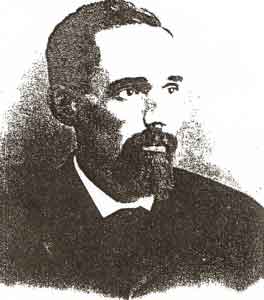
KING, EDWARD (1847-1891). First class fireman, United States Navy. Originally from Ireland, King enlisted as a fireman in the United States Navy at Brooklyn in August 1862. He served on the USS Wabash, Magnolia, and Metacomet. He re-enlisted as a second class fireman on September 22, 1863, and served on the USS North Carolina (until November 25), Camelia (until July 15, 1864), Wabash (until August 31) and was discharged from the Princeton on October 30, 1864. Subsequently, he enlisted as a seaman on November 23, 1864, and served on the USS North Carolina (until December 10), Potomac (until December 31), and was discharged from the Metacomet as a first class fireman on August 15, 1865. (His widow’s pension application states that he suffered from fevers and might have been discharged for disability but that is not noted on his pension records.) King received a pension from the Navy, certificate 9,463.
According to his death certificate, he worked as a sailor. He last lived at 340 17th Street in Brooklyn and was originally interred at Cypress Hills Cemetery in Queens, New York, but was removed to Green-Wood in 1916. Sarah King, his widow, applied for a pension in 1893 that was granted under certificate 9,493. Clarinda King, their daughter, appealed to the pension board to continue giving the widow’s pension to her in 1945, attesting to her single status and the fact that she cared for her mother, an invalid for much of her life who died in 1916, and was no longer able to support herself at age 68. Section 202, lot 28285, grave 1.
KING, FRANK (1842-1885). Fire department foreman; Civil War veteran. Born in New York City, King joined Engine 16 of the Volunteer Fire Department at an early age, but enlisted in a New York State regiment at the outbreak of the Civil War, where he served “with credit.” After a time, he joined the Navy and remained in the flagship corps until the war ended.
King rejoined the fire department upon his return, receiving an appointment as a fireman in 1868 and achieving the rank of foreman of Engine 13 by the middle of 1873. King had a slight physique but was renowned for his ability to “withstand more heat and smoke than men more robust in appearance.” Contemporaries also noted King’s attention to the less fortunate, as he frequently cared for the sick and needy despite his own “meager means.”
He died of a kidney ailment, Bright’s disease (known today as acute nephritis); colleagues blamed the malady on “exposure” King suffered during a serious fire on College Place two months before, although this is medically unlikely. King’s fire department comrades attended his funeral procession from his home on MacDougal Street across the Brooklyn Bridge to Green-Wood, where he was interred with Masonic ceremonies. Section 206, lot 21704.
KING, GILBERT SNOWDEN (1839-1908). Private, 83rd New York Infantry, Company C. Born in New York, King enlisted at New York City on May 27, 1861, and mustered into the 83rd New York that day. After being wounded at Antietam, Maryland, on September 17, 1862, he was discharged for disability two months later on November 11 at Frederick, Maryland. His application for an invalid pension was granted, certificate 17,086. As per his obituary in the Brooklyn Daily Eagle, he was a member of the Erastus T. Tefft Post #335 of the G.A.R.; members of the organization were invited to attend his funeral. King last lived in Brooklyn but died from Bright’s disease in Los Angeles. His widow, Eunice King, applied for a pension in 1909, application 911,990, but there is no certification number. Section 198, lot 29486, grave 7.
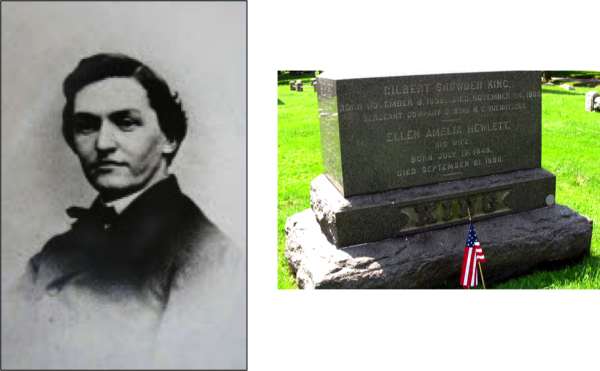
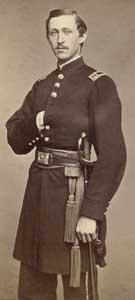
KING, HORATIO COLLINS (1837-1918). Medal of Honor recipient; colonel, lieutenant colonel and major by brevet; major and quartermaster, United States Volunteers. Born in Portland, Maine, King’s father was the Postmaster General of the United States under President Buchanan. He grew up in Washington, D.C., and was an 1858 graduate of Dickinson College in Carlisle, Pennsylvania, where his uncle Charles Collins was its president. He studied law in the office of Edwin M. Stanton (Secretary of War in the Lincoln administration), was admitted to the bar in 1861, but shortly thereafter went off to fight in the Civil War, enlisting at Brooklyn as a captain on August 19, 1862, and being commissioned into the United States Army’s Quartermaster’s Department that day. He served in the Army of the Potomac and the Army of the Shenandoah, headed the commissary department of the Army of the Potomac 1864-65 as major and quartermaster of the United States Volunteers, and was brevetted major, lieutenant colonel and colonel in 1865. His brevet to colonel cited his gallantry at the Battle of Five Forks, Virginia.
King was awarded the Medal of Honor in 1897 for his actions near Dinwiddie Courthouse, Virginia, on March 31, 1865. His citation reads: “While serving as a volunteer aide, carried orders to the reserve brigade and participated with it in the charge which repulsed the enemy.” It was from his supplies that were drawn provisions for the Confederates who had surrendered with Lee at Appomattox. Additional information on his Medal of Honor follows (from W. F. Beyer and O. F. Keydel, Deeds of Valor, How America’s Civil War Heroes Won the Congressional Medal of Honor (originally published in 1905):
On the 31st of March, 1865, Sheridan’s Cavalry Corps developed two divisions of Confederate infantry and one of cavalry near Five Forks, Va., and Major Horatio King, chief quartermaster of the first division, feeling that he could safely leave his train in charge of the senior brigade quartermaster, tendered his services to General Devin as a volunteer aide on his staff and was granted permission to accompany him. Owing to the wooded character of the country the cavalry fought dismounted. The ground was stubbornly contested until about four P.M., when a report was brought from the Seventh Pennsylvania Cavalry that the Federal line was driven back. At this time Major King was the only staff officer remaining with General Devin, commanding the division, and he was requested to hunt up the reserve brigade under General Gibbs and hurry them to the aid of the Second Brigade. The reserve was somewhere on the extreme left of the line, so, following the direction of the firing with all possible speed for about three-quarters of a mile, the major found General Gibbs, delivered his orders, and proceeded with him at once to the critical position where the brigade was deployed. They arrived just in time to repel a charge of the Confederate infantry and save the line from serious disaster, Major King accompanying General Gibbs and participating in the charge.
The fighting continued until dark, when, finding that the troops he had were unequal to the task of dislodging the Confederates from their strong works, General Devin withdrew his forces to the neighborhood of Dinwiddie Court House. On the following day, in consequence of the imminent danger of the train, General Sheridan directed Major King to return and resume charge.
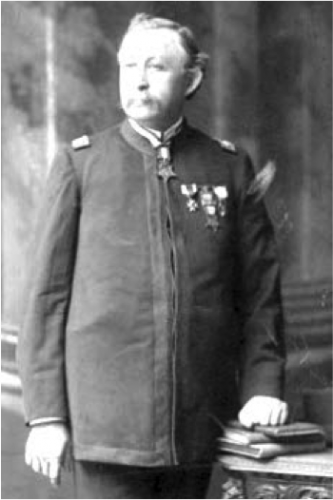
He was also active in fund-raising fairs for the Sanitary Commission, a pre-cursor to the Red Cross and the U.S.O., that treated the sick and wounded, worked to improve sanitary conditions in camps, and offered financial help to soldiers. The Brooklyn Fair, held at the Academy of Music on Montague Street in March 1864, raised $400,000, the greatest amount to that date. After the War, King married his second wife, Esther Augusta Howard, whose father, Captain John T. Howard, served with him.
He returned to the practice of law in New York until 1871, commanded the 11th Brigade, New York National Guard in 1876, and was appointed Judge Advocate General of New York in 1883, with the rank of brigadier general. In the 1870s he was associate editor of the New York Star and publisher of the Christian at Work and the Christian Union. He also contributed his work to magazines, and wrote The Brooklyn Congregational Council (1876), King’s Guide to Regimental Courts-Martial (1882), and edited Proceedings of the Army of the Potomac (1879-1887). King served as secretary of the Society of the Army of the Potomac from 1877-1904, and became president of that organization in 1904.
Active in civic and military organizations, he was a member of the G.A.R., where he served as post commander for two years and department judge advocate general for one year, the Freemasons, the Elks, and a charter member of the New York Commandery of the Military Order of the Loyal Legion. In addition, he was a member of the Brooklyn Board of Education for 10 years and a member of the Monuments’ Commission. King was defeated when he ran for Secretary of State of New York in 1895 as a Democrat and then ran unsuccessfully for Congress in 1896 for the Sound Money Party. King was also. Devoted to his alma mater, Dickinson College, he was a trustee from 1896-1918, and wrote the school song, Noble Dickinsonia. He was a resident of Brooklyn and served as the secretary of Plymouth Church there. His death was caused by myocarditis. Section 93, lot 33, grave 76.
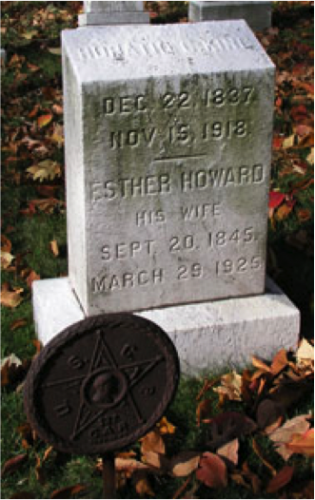
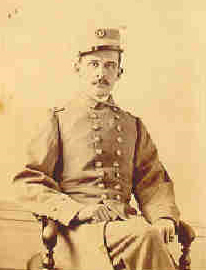
KING, LESLIE G. (or R.) (1841-1919). Second assistant engineer, Confederate States of America Navy; private, 9th Virginia Infantry, Company K, Confederate States of America. Born in Virginia, King resided in Portsmouth, Virginia, and was employed as an engineer’s apprentice at the start of the Civil War. He first served as a private in the 9th Virginia Infantry, known familiarly as the Old Dominion Guard. Subsequently, he enlisted on April 29, 1862, as a third assistant engineer and was commissioned into the Confederate Navy on that day. From 1862-1863, he served on the CSS Georgia, which was part of the Savannah Squadron, and then was assigned to the CSS Atlanta. The Atlanta had been modified into an armored ship but the modifications made it difficult for her to operate in shallow waters and her armored roof made the interior of the ship turn into a humid oven in hot weather.
Captured while serving aboard the Atlanta by the Union forces on board the USS Weehawken (see image below) on June 17, 1863, King was taken as a prisoner of war, sent to Fort Lafayette, New York Harbor, and then held at Fort Warren in Boston Harbor on July 4, 1863. On June 2, 1864, he was commissioned into the Provisional Confederate Navy as a second assistant engineer. He was paroled on September 28, 1864, at Fort Warren, Massachusetts, and exchanged on October 18 at Cox’s Wharf, Virginia. On April 15, 1865, he was paroled at Richmond, Virginia. King also served on the CSS Tallahassee (1864), and the CSS Columbia (Charleston Station, 1864-1865). After the War, he was employed for twenty-eight years in the Shipbuilding Department of the Brooklyn Navy Yard as a draftsman. He last resided in Slingerlands, New York, where he died of arteriosclerosis. Lot 11165, section 182.
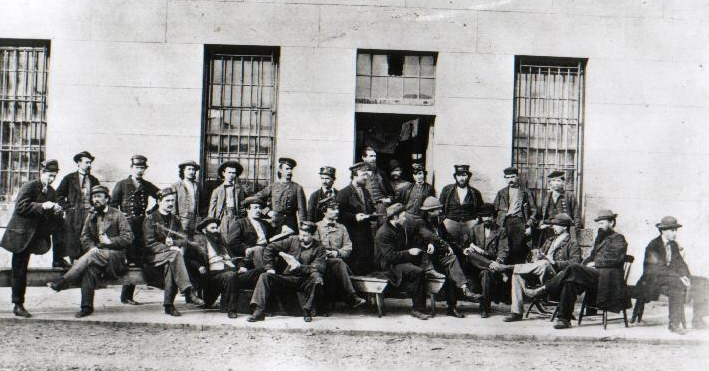
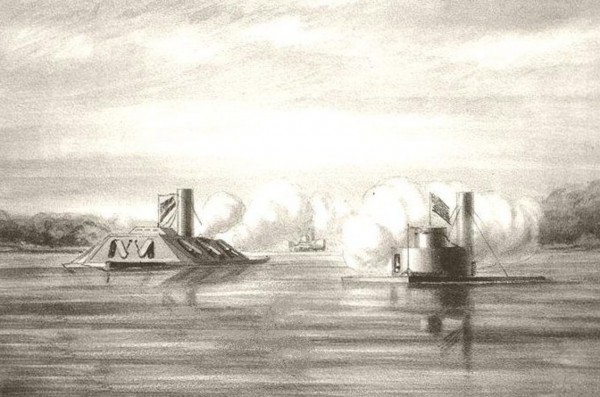
KING, ROBERT (1823-1878). Captain, 133rd New York Infantry, Company D. Of English birth, he enlisted at New York City as a captain on August 29, 1862, mustered into the 133rd the next month on September 24, and was discharged for disability on August 21, 1863, at New Orleans, Louisiana. King last lived at 385 Cumberland Street in Brooklyn. He succumbed to heart disease. Section 143, lot 22361.
KING, SAMUEL J. (1834-1896). Private, 71st Regiment, New York State Militia, Company B. King enlisted in 1861 as a private for a tour of three months and mustered into Company B of the 71st Regiment. He last lived at 938 Lafayette Avenue in Brooklyn. After his death from pneumonia, Jane G. King, applied for and received a widow’s pension, certificate 448,849. Section 57, lot 28782.
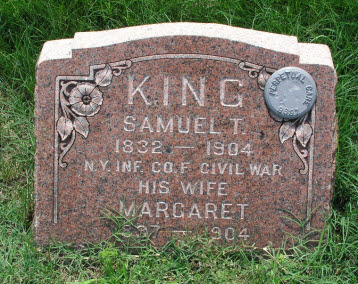
KING, SAMUEL T. (1832-1904). Private, 12th New York Infantry, Companies B and D; 5th New York Veteran Infantry, Company F. He enlisted as a private at New York City on September 4, 1862, mustered immediately into Company B of the 12th New York, was transferred into Company D on June 23, 1863, and was transferred into the 5th New York Veteran Infantry on June 2, 1864. His death was attributed to hemiplegia. Section 114, lot 8999, grave 414.
KING, THEODORE FREDERICK (1843-1917). Captain, 158th New York Infantry, Companies E and C. On August 31, 1862, he enlisted as a first lieutenant at Brooklyn and was commissioned into the 158th on September 3. He was promoted to captain on November 30, 1864, effective upon his transfer to Company C on that day, and was discharged for disability on June 16, 1865. He lived at 14 Central Park West in Manhattan. His death was attributed to apoplexy. Section 35, lot 5120.
KINGHORN, THOMAS (1832-1871). Veterinary surgeon, 6th Ohio Cavalry, Company A. A native of Scotland, Kinghorn enlisted as a farrier on October 18, 1861, and mustered into the 6th Ohio Cavalry on December 6. On December 31 of that month, he was promoted to veterinary surgeon, and was discharged on October 16, 1862. His last residence was 223 9th Avenue in Brooklyn where he died of dropsy. Section A, lot 17244, grave 6.
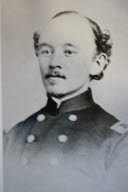
KINGSBURY, CHARLES PEEBLE (1816-1879). Brigadier general, colonel and lieutenant colonel by brevet; major, United States Army Ordnance Department. Born in Clyde, New York, he graduated from the United States Military Academy in 1840 (2nd in a class of 42), and entered the United States Army as a second lieutenant of ordnance. He served in Texas, and fought in the Mexican War as General Wolf’s ordnance officer and on General Taylor’s staff. On February 23, 1847, he was brevetted first lieutenant for “gallant and meritorious conduct in the Battle of Buena Vista, Mexico.” In addition to his military duties, he wrote, Elementary Treatise on Artillery and Infantry (1849), and was a contributor to the American Whig Review, Western Quarterly Review, Putnam’s Monthly, and the Southern Literary Messenger from 1840‑67. After the Mexican War, he served as an inspector of armories and arsenals, was promoted to captain of ordnance on July 1, 1854, in recognition of fourteen years of continuous service, and was principal assistant to the chief of ordnance from March 20, 1861-April 24, 1861.
In April of 1861, Kingsbury was the superintendent of the United States Armory at Harpers Ferry, Virginia, when it was burned to prevent it from falling into Confederate hands. He was chief of ordnance of the Department of the Ohio from June 7, 1861, through August 12, 1861, and the served in that position for the Army of the Potomac from August 12, 1861, through July 15, 1862, during which time he was promoted to colonel and additional aide-de-camp on September 28, 1861.
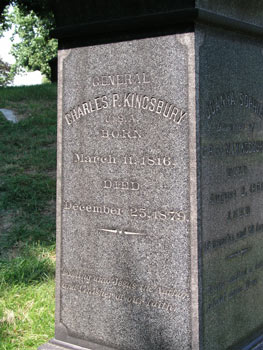
Kingsbury served in the Peninsula Campaign until he was relieved by reason of sickness at Harrison’s Landing, Virginia. Kingsbury then was on special duty for the War Department aiding Union governors before he became inspector of heavy ordnance at Pittsburgh, Pennsylvania, on November 19, 1862. He was promoted to major on March 3, 1863. He left Pittsburgh on August 1, 1863, for Rock Island, Illinois, where he was in charge of construction of the arsenal there. In 1864-1865, he was engaged in arming and equipping Iowa, Wisconsin and Minnesota volunteers. He was brevetted lieutenant colonel, colonel and brigadier general on March 13, 1865, commanded the Watertown, Massachusetts, arsenal as of July 19, 1865, and retired from the United States Army with the rank of lieutenant colonel on December 31, 1870. He last resided in Brooklyn. His death was due to heart disease. Section 60, lot 4439.
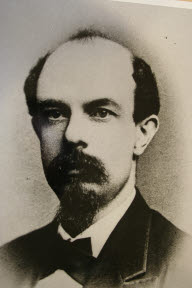
KINGSLAND, EDWARD W. (1839-1890). Sergeant, 7th Regiment, New York State Militia, Company F. Kingsland enlisted as a sergeant at New York City on April 25, 1861, and mustered into the 7th Regiment. At some point during his service, he was listed as absent on leave. He was a member of the G.A.R. , an organization for Civil War veterans. Kingsland died of phthisis. Section 166, lot 10607.
KINGSLEY, EDWARD (1838-1871). Private, 52nd New York Infantry, Companies H and D. A New Yorker by birth, he enlisted as a private at New York City on September 14, 1863, and mustered immediately into the 52nd New York. After transferring within the regiment to Company D on October 4, 1864, he deserted on October 15. His last residence was 176 Cumberland Street in Brooklyn. His death was caused by consumption. Section 114, lot 17890.
KINGSLEY, HENRY C. (1839-1890). Private, 51st New York Infantry, Company D. A native New Yorker, he enlisted there on October 1, 1861, mustered into the 51st New York that day, and deserted on September 20, 1862, at Antietam, Maryland. He last resided on Smith Street in Brooklyn. Pneumonia was the cause of his death. Section 59, lot 3681.
KINNEY, JOHN P. (enlisted as KENNIN, JOHN P.) (1830-1886). Second lieutenant, 145th New York Infantry, Company E. Kinney was born in Ireland. Using the alias John P. Kennin, he enlisted as a first sergeant at New York City on July 21, 1862, and mustered into the 145th New York on September 11. He was promoted to second lieutenant on April 8, 1863, and mustered out on January 6, 1864. In 1886, his application for an invalid pension was granted, certificate 335,791. His last address was 393 State Street in Brooklyn. Shortly after his death from haematemesis, which causes vomiting of blood, Fredericka Kinney, who is interred with him, was granted a widow’s pension, certificate 293,001. Section M, lot 24208.
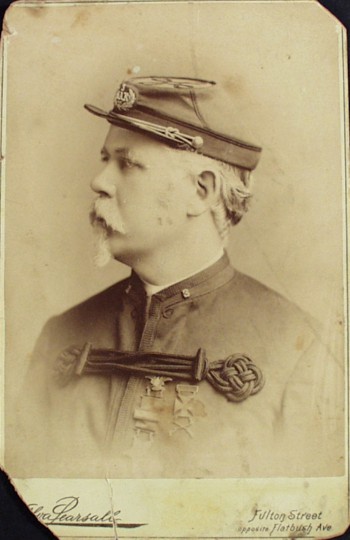
KINSEY, CHARLES J. (1834-1912). First lieutenant, 15th New York Heavy Artillery, Companies H, B, and E; quartermaster, 2nd Independent Battery, New York Light Artillery. English by birth, Kinsey enlisted at New York City as a private on June 4, 1861, and mustered into the 2nd New York Light Artillery that same day. At some point, he was promoted to quartermaster and then reduced to ranks before his discharge for disability on April 24, 1862. On October 8, 1863, he re-enlisted as a second lieutenant at Washington, D.C, and was commissioned immediately into Company H of the 15th New York Heavy Artillery. On July 20, 1864, he was promoted to first lieutenant and was transferred to Companies B and E before he was discharged on August 22, 1865, at Washington, D.C.
In 1871, Kinsey applied for and received an invalid pension, certificate 125,325. According to the census of 1880, he was a carpenter by trade. Kinsey is listed in the 1890 Veterans Schedule for Brooklyn. His obituary in the Brooklyn Daily Eagle confirmed his Civil War service. Kinsey died from nephritis. His last residence was 332 8th Street in Brooklyn. Section 143, lot 27742, grave 2.
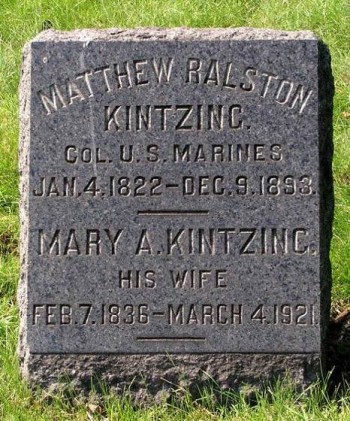
KINTZING, MATTHEW RALSTON (1822-1893). Lieutenant colonel, United States Marine Corps. Born in Philadelphia, Pennsylvania, Kintzing spent 38 years serving his country, 10 years at sea and 28 on shore duty. He was commissioned second lieutenant in the Marine Corps on September 8, 1841, at which time he was assigned to the Vincennes in the Home Squadron through 1845. Kintzing was then at the Marine Barracks at Philadelphia from 1845-46 prior to his return to the Home Squadron. His various engagements included a shipwreck in the Bahamas and being wounded at Tabasco in the Mexican Gulf in 1847, the year of his promotion to first lieutenant on July 16. After shore duty in Massachusetts, he subsequently spent two years fighting pirates in Africa near Benin and along the Congo coast on the sloop Cumberland, and was promoted to captain on August 1, 1860.
When the Civil War broke out, Kintzing was present at the destruction of the Naval Yard in Norfolk, Virginia, served on board the steamship Roanoke in the Atlantic Blockading Squadron in 1861, and participated in engagements with the Merrimac and at the Sewall’s Point Batteries, Virginia. In 1862, he went to Philadelphia for recruiting service. During his assignment to establish marine barracks at Cairo, Illinois, from 1863-64, he was commissioned lieutenant colonel on June 10, 1864. Kintzing was then assigned to the barracks in Philadelphia and the Mare Island Navy Yard in San Francisco. He was commissioned colonel on December 7, 1867, when he served in Philadelphia, a term lasting until 1877. Subsequent service was at the Brooklyn Navy Yard and a short stint at Norfolk prior to retirement. He last lived at 215 Park Place in Brooklyn, his wife being from a family with longtime roots there. Cirrhosis of the liver caused his death. Section 173, lot 21516, grave 1.
KINZY, FREDERICK (1838-1914). Private, 7th West Virginia Infantry, Companies G and D. Of German origin, Kinzy enlisted as a private and mustered into Company G of the West Virginia Infantry. At some point, he was transferred intra-regimentally to Company D. Further details of his service are unknown. His last residence was 289 6th Street in Brooklyn. Kinzy died from cancer. Section 2, lot 5499, grave 1818.
KIP, HENRY (1839-1897). Private, 22nd Regiment, New York State National Guard, Company D. A native of Chicago, Illinois, Kip enlisted at New York City as a private on May 28, 1862, mustered into the 22nd Regiment the same day, and served until he mustered out after three months on September 5 at New York City. He resided in Chicago at the time of his death from dysentery. Section 34, lot 20710.
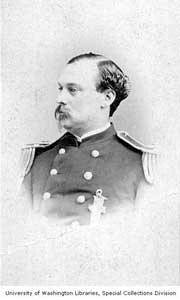
KIP (or KIPP), LAWRENCE (1836-1899). Lieutenant colonel, major, and captain by brevet; major and aide-de-camp, United States Volunteers; adjutant, 3rd Light Artillery, United States Army. Kip, who was born in New York, attended the United States Military Academy from July 1, 1853-May 31, 1854. Prior to the Civil War, he enlisted and was commissioned as a second lieutenant on June 30, 1857, and served in the 4th Light Artillery of the United States Army until he transferred into the 3rd Light Artillery on August 27 of that year.
At the start of the Civil War, Kip rose to first lieutenant on May 14, 1861, and to adjutant on September 27. On August 20, 1862, he was promoted to major and aide-de-camp and commissioned that day into the United States Volunteers Aide-de-Camp. On October 1, 1862, Major General Edwin V. Sumner, United States Army, wrote in his field report from Harpers Ferry, Virginia, about the Battle of Antietam, Maryland (September 17), praising Kip, his aide, for his “zeal and devotion.” Sumner noted, “These young men behaved in the most gallant manner, and did all that men could do to aid me throughout this trying battle.” Kip served with United States Volunteers until his resignation on August 15, 1863. On June 11, 1864, he was promoted to captain by brevet for his service at Trevillian Station, Virginia. After re-enlisting as lieutenant colonel on July 13, 1864, he was commissioned into the Field and Staff of the 8th New York Heavy Artillery, but declined that commission. He was brevetted to major on March 31, 1865, for actions at Dinwiddie Court House, Virginia, and brevetted to lieutenant colonel on April 1, 1865, for service at Five Forks, Virginia. Kip was promoted to captain on August 13, 1866. Kip last lived in New York City. His death was caused by cancer. Section 19, lot 9005, grave 27.
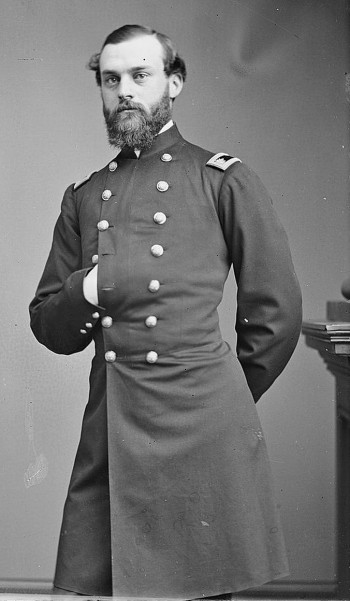
KIP, THOMAS C. (1840-1890). Musician, 61st New York Infantry. A native New Yorker, he enlisted at New York City on August 26, 1861, and mustered into the 61st as a musician the next month on September 5, but was not assigned. His last address was in Jersey City, New Jersey, where he died of cancer. Section 78, lot 2063.
KIPP, WILLIAM HALSTEAD (1839-1918). First lieutenant, 7th Regiment, New York State National Guard, Company D. Born in New York City, Kipp enlisted there as a private on April 17, 1861, mustered into the 7th Regiment’s State Militia on April 26, and mustered out with his company on June 3 of that year at New York City. When the 7th Regiment was re-activated on May 25, 1862, and part of the New York State National Guard, he returned to his company as a corporal, and mustered out of service after three months on September 5, 1862, at New York City. In 1863, he was commissioned into the 7th Regiment as a first lieutenant and served for 30 days. After the War, he was a colonel in the 7th Regiment’s Field and Staff where he was brevetted to brigadier general on January 20, 1908, by Governor Hughes in recognition of 50 years of service with the regiment. On November 24, 1884, he was appointed chief clerk of the New York City Police Department and remained on duty until his death from apoplexy in 1918. He was the brother-in-law of Stephen Burdett Hyatt (see). His last residence was 20 West 121st Street in Manhattan. Section 182, lot 9458.
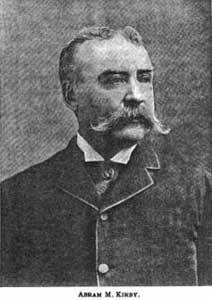
KIRBY, ABRAHAM (or ABRAM) M. (1839-1901). Artificer, 13th Regiment, New York State Militia, Sappers and Miners. Kirby was an artificer with the 13th Regiment for three months in 1861. He last lived at 426 Clinton Street in Brooklyn. His death was attributed to uraemia, a kidney-related disease. Section 205, lot 30155, grave 3.
KIRBY, EDGAR (1836-1912). Second lieutenant, 5th New York Heavy Artillery, Companies H, D, and G. Kirby, a native of New York State, enlisted as a private at New Castle, New York, on September 9, 1862, the same date that he mustered into Company H of the 5th New York Heavy Artillery. He rose to corporal on January 24, 1863, and was commissioned as second lieutenant on June 22, 1863, effective upon his intra-regimental transfer to Company D that day. At some point, he was transferred to Company G. Kirby was dishonorably discharged on or about November 15, 1863. As per his obituary in the New York Herald, he was a Freemason and member of the William McKinley Post #203 of the G.A.R.; members of both organizations were invited to attend his funeral. His last residence was 239 East 238th Street in the Bronx. He succumbed to pneumonia. Section 70, lot 2097.
KIRCHNER, FREDERICK (1827-?). Private, 29th New York Infantry, Company H. He may have been the Frederick Kirchner who, at the age of 34, enlisted at New York City on April 17, 1861, mustered into the 29th New York on June 4, and mustered out at New York City on June 20, 1863. His death was caused by marasmus, a form of severe malnutrition. Section ?, lot ?.
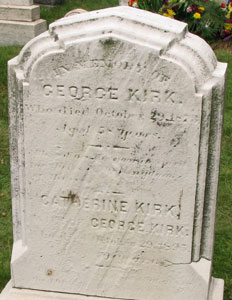
KIRK, GEORGE (1815-1873). Private, 158th New York Infantry, Company B. Of English birth, Kirk enlisted at New York City and served with the 158th New York. Other details are unknown. His last residence was 198 Johnson Street in Brooklyn. The cause of his death was gangrene of the lungs. In 1879, Catherine Kirk, who is interred with him, applied for and received a widow’s pension, certificate 307,210. Section 59, lot 1459, grave 26.
KIRK, THOMAS C. (1823-1868). Private, 37th New York Infantry, Company K. Born in England, he enlisted at New York City as a private on May 25, 1861, and on June 7, 1861, mustered into the 37th New York. He mustered out on June 22, 1863, at New York City. His last residence was 148 Tillary Street in Brooklyn. Section A, lot 8100, grave 963.

KIRKHAM, EDWARD (1834-1904). Corporal, 53rd Pennsylvania Infantry, Company F. Of English birth, he enlisted as a corporal on October 12, 1861, was immediately mustered into the 53rd Pennsylvania Infantry, and was discharged on an unspecified date. In 1864, he applied for and received an invalid pension, certificate 31,894. After the War, he was a chaplain of the G.A.R.’s McPherson-Doane Post #499 and Moses F. O’Dell Post #443 in Brooklyn. Kirkham is listed in the 1890 Brooklyn Veterans Census, a confirmation of his Civil War service. As per his obituary in the New York Herald, members of the Moses F. Odell Post of the G.A.R. were invited to attend his funeral. His last residence was 303 Flatbush Avenue in Brooklyn. He died of heart disease. Jane Kirkham applied for and received a widow’s pension in 1905, certificate 603,834. Section 158, lot 17261.
KIRKHAM (or KIRKMAN), THADDEUS (1836-1868). Private, 7th New York Heavy Artillery, Company B. After enlisting as a private at Albany, New York, on August 5, 1862, he mustered into the 7th Heavy Artillery on August 18, and deserted on May 18, 1863, at Fort De Russy in Washington, D.C. He last lived at 11 17th Street in Brooklyn. Section 59, lot 11734, grave 23.
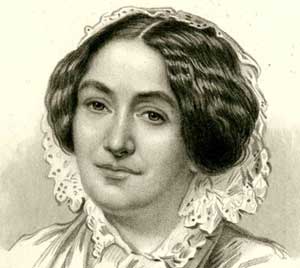
KIRKLAND, CAROLINE MATILDA (1801-1864). Author, organizer of the Brooklyn Sanitary Fair. A native of New York City, Caroline Stansbury Kirkland was a granddaughter of Joseph Stansbury, a Royalist in Philadelphia, Pennsylvania, during the American Revolution. A student of language and literature, she was educated at her aunt’s girls’ schools in Manhattan and Mamaroneck, New York, and then helped run the school until her marriage in 1828. Her husband, William Kirkland (see), was a professor of classics at Hamilton College in New York. When they moved to Michigan in 1835, the Kirklands were active in the Underground Railroad, shepherding slaves to freedom in Canada. An author, who wrote as Mary Clavers, she specialized in sketches of prairie life. She was the first author to write novels about life on the frontier in A New Home, Who’ll Follow, Or Glimpses of Western Life (1839) based on her experiences. In addition, she wrote Forest Life (1842), and Western Clearings (1845). Kirkland also used the pseudonym Aminadab Peering.
Kirkland’s family returned to New York in 1843 where her husband died accidentally in 1846. After William’s death, she took over his job as editor of the Christian Inquirer and continued to run a girls’ school in her home. Active in literary circles, Edgar Allen Poe wrote a description of her in Godey’s Lady’s Book in 1846, “She is rather above the medium height; eyes and hair dark; features somewhat small, with no marked characteristics but the whole countenance beams with benevolence and intellect.” Her home became a salon for writers including Poe, William Cullen Bryant, Elizabeth Drew Stoddard and others. She traveled to Europe in 1848 and 1850, while working as a writer for Union Magazine, and met Charles Dickens, Robert Browning and Elizabeth Barrett Browning. Always interested in the down-trodden, she was on the executive committee of the Home for Discharged Female Convicts. In 1853, she wrote a plea asking for help for these women.
During the Civil War, Kirkland spoke out about the lack of sanitation and supplies for soldiers in the May 1863 issue of the Continental Weekly. She was also an active organizer of the Brooklyn (Long Island) Sanitary Fair and member of its Committee on Arms and Trophies. She spent three months devoting her time to preparation for the event. After her sudden death in April 1864, shortly after the Fair opened, women who worked with her said in tribute, “She was greater than her books, or than any single book.” The Fair raised $1.5 million for the Union. Her son, Joseph Kirkland (see), was a noted writer. Section 163, lot 14793.
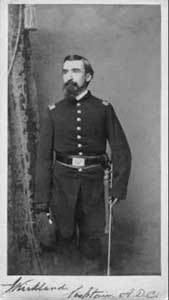
KIRKLAND, JOSEPH (1830-1894). Major by brevet; captain and aide-de-Camp, United States Volunteers; second lieutenant, 12th Illinois Infantry, Company C. Kirkland is not buried at Green-Wood; the cenotaph on his family’s lot honors his memory. Kirkland was born in Geneva, New York. As per his obituary in The New York Times, his father, William Kirkland (see), was a professor of classics at Hamilton College in New York and his mother, Caroline Stansbury Kirkland (see), was a granddaughter of Joseph Stansbury, a Royalist in Philadelphia, Pennsylvania, during the American Revolution. His grandfather, Joseph Kirkland, was the first mayor of Utica, New York. In 1835, his family moved to Detroit, Michigan, in 1835, where his father directed the Detroit Female Seminary and then lived in Pinckney, Michigan, from 1837-1843, where his mother, who also used the name Mary Clavers, wrote sketches of prairie life. While in Michigan, William Kirkland was active in the Underground Railroad, helping slaves escape to Canada and was a member of the American Anti-Slavery Society there. The family returned to New York in 1843; his father, nearsighted and deaf, died three years later when he accidentally walked off a pier and drowned. Joseph Kirkland then turned to the sea and visited his uncle in England a year later. By 1852, he was a clerk and reader in the offices of Putnam’s Monthly Magazine, then moved to Illinois in 1855. A businessman and supervisor of the Tilton [Illinois] Coal Company as of 1858, he was a member of the committee that informed Abraham Lincoln of his nomination for the Presidency in 1860. On January 7, 1861, he wrote to President-elect Abraham Lincoln asking to be considered for the job of private secretary. He wrote:
The post of private secretary seems to be one requiring a rather uncommon combination of literary and business talent. If you have not already selected yours I should like to know it and add one to the number among whom you can take your pick. My own acquaintance with you is not such as would probably recall me to your mind, being confined to the evening you spent at my house in company with Col. Foster, the English Lord Grosvenor and others, but I have many friends among the editorial Fraternity in New York and Chicago (Mr. [William Cullen] Bryant, especially) and many business friends whom you know, and from them I would get letters if you encourage me to do so.
At the onset of the Civil War, he enlisted as a second lieutenant on April 25, 1861, was commissioned into the 12th Illinois on May 2, and mustered out on August 1. When the company was ready to assemble at Cairo, Illinois, Kirkland made sure that the soldiers had blankets, camp kettles and other supplies that the citizens of Chicago had donated to the Union cause. He later wrote that he found it hard to adjust to the realities of war and sought to transfer to an aide-de-camp position. On August 25, 1861, he was commissioned as a full captain into the Aide-de-Camp, U.S. Volunteers, was promoted to full captain and assistant aide-de-camp on August 26, and served as aide-de-camp to General George B. McClellan in the West Virginia campaign before he was assigned to the Adjutant General’s Department on November 1. He served on the staffs of Fitz John Porter (see) during the siege of Yorktown, Virginia, and fought at the Sevens Days Battle. Kirkland came down with jaundice at Harrison’s Landing, Virginia, and rejoined the forces prior to the Battle of Antietam, Maryland. He was promoted by brevet to full major on August 20, 1862, He also served under General Ambrose Burnside. During the Battle of Fredericksburg, Virginia, in December 1862, his horse was shot from under him. He resigned on January 7, 1863, after Porter was relieved of his post.
In 1864, Kirkland published the first edition of Prairie Chicken, a Midwestern literary periodical. He went on to study law, scored highest on the exam when he was admitted to the Bar in 1880 and practiced for ten years. Also a novelist and playwright, his works include The Married Flirt (1880); Zury: The Meanest Man in Spring County (1887); The McVeys: An Episode (1888); The Captain of Company K (published serially from 1890-1891 and the winner of a contest sponsored by the Detroit Free Press); The Story of Chicago (1891); and The Chicago Massacre of 1812 (1893). Kirkland became literary editor of the Chicago Tribune in 1889 and co-editor of The History of Chicago in 1893, a work that his daughter took on after his sudden death from a heart attack in 1894. He last lived in Chicago, Illinois. A testimonial by the mayor of Chicago, after Kirkland’s death, said in part, “…Chicago points with pleasure and with pride to the products of his genius in the story of her giant progress, and those other works that have linked his name to hers in a loftier connection. Deservedly classed among her ‘old settlers,’ his whole career has been one of exemplary citizenship.” On August 3, 1991, the Tilton Historical Society dedicated a plaque commemorating Lincoln’s visits to Kirkland’s home in the 1850s. The cenotaph is at section 163, lot 14793; Kirkland is interred at Graceland Cemetery in Chicago.
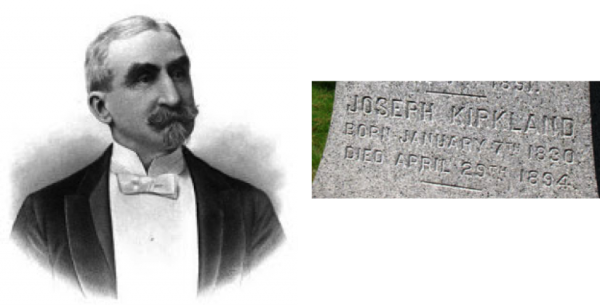
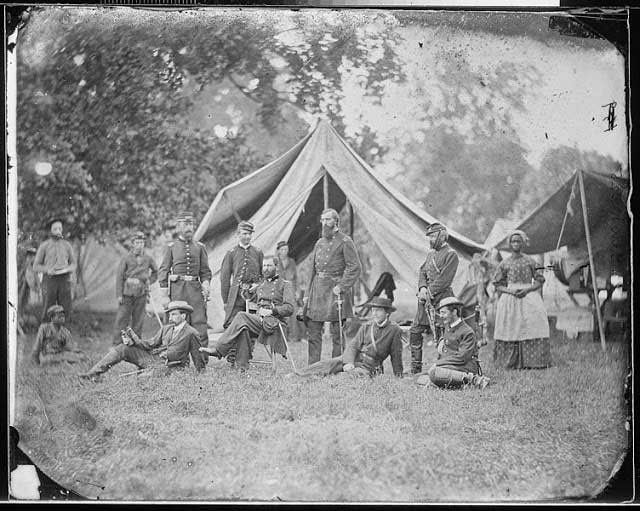
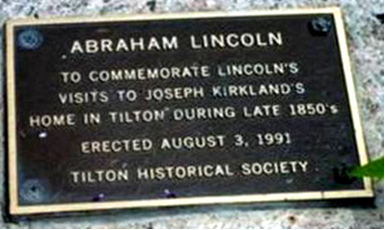
KIRKLAND, WILLIAM (1800-1846). Abolitionist. A native of New York, his father, Joseph Kirkland, was the first mayor of Utica, New York. William Kirkland was a professor of classics at Hamilton College in New York and his wife, Caroline Stansbury Kirkland (see), was a granddaughter of Joseph Stansbury, a Royalist in Philadelphia, Pennsylvania, during the American Revolution. In 1835, the family moved to Detroit, Michigan, where William Kirkland directed the Detroit Female Seminary. He then lived in Pinckney, Michigan, from 1837-1843, where Caroline Kirkland, who wrote under the name Mary Clavers, penned sketches of prairie life. William built a grist mill and tavern in Pinckney and was joined there by two of his brothers. While in Michigan, William Kirkland was active in the Underground Railroad, helping slaves escape to Canada, and was a member of the American Anti-Slavery Society there, serving on the committee to draft the society’s constitution. While rejecting violence, the goal of the Michigan Anti-Slavery Society was “the entire abolition of slavery in the United States of America.” Among its other goals was petitioning Congress to end the slave trade and slavery, extending the right to vote to all men, and helping educate all blacks in Michigan. The family returned to New York City in 1843 and Kirkland was the editor of the New York Evening Mirror and editor and owner of Christian Inquirer. In 1846, nearsighted and deaf, he accidentally walked off a pier and drowned. His wife, who is interred with him, took his place as editor and his son, Joseph Kirkland (see), followed in his footsteps as an author and anti-slavery advocate. He last lived at 143 Green Street in Manhattan. Section 163, lot 14793.
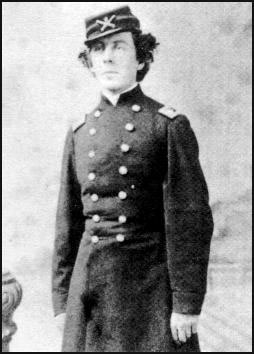
KITCHING, JOHN (or JAMES, J.) HOWARD (1838-1865). Brigadier general by brevet; colonel, 6th New York Heavy Artillery; captain, 2nd New York Heavy Artillery, Company B. New York City-born and resident of Dobbs Ferry, New York, where he worked as a merchant, Kitching enlisted as a captain at New York City on August 19, 1861, was commissioned into the 2nd New York Heavy Artillery on September 18, and was discharged on July 6, 1862. On September 6, 1862, he was commissioned into the 6th New York Heavy Artillery after a promotion to lieutenant colonel three days beforehand, and rose to colonel on April 1, 1863. Kitching briefly commanded the Army of the Potomac’s ammunition train in late 1863 and early 1864.
He fought at the Battles of the Wilderness, Spotsylvania, Cold Harbor and Petersburg, Virginia, and then took part in the Battle of Fort Stevens in support of the defenses of Washington, D.C. Kitching’s troops joined the Army of the Shenandoah as of September 27, 1864, and were known as Kitching’s Provisional Division. In the early morning of October 19, 1864, Confederate General John B. Gordon surprised the Union Army at Cedar Creek, Virginia, first attacking Brigadier General Rutherford B. Hayes’s neighboring division and forcing them to retreat. Before the Confederates reached Kitching’s men, who numbered about 1,000, they too, began to retreat. At that time, Kitching was severely wounded in the ankle. In the wake of the disaster, Union troops fought to buy time so that Union trains near Belle Grove could escape to the North. The Confederates ultimately failed in their efforts to capture Major General Philip Sheridan.

Kitching returned home to recover but died from his wounds at Dobbs Ferry on January 11, 1865. Posthumously, he was brevetted to brigadier general dated to August 1, 1864, for “meritorious and distinguished service during the campaign of 1864 before Richmond.” In 1865, Harriette Kitching, sought a widow’s pension, application 98,207. Section 132, lot 362.
KITSON, GEORGE (1841-1865). Private, New York Marine Light Artillery, Company F. Originally from Ireland, Kitson enlisted at New York City as a private on February 9, 1862, the same day that he mustered into the New York Marine Light Artillery. He was discharged at New Berne, North Carolina, on January 17, 1863. His last residence was 2097 Wooster Street in Manhattan. Section 114, lot 16491.
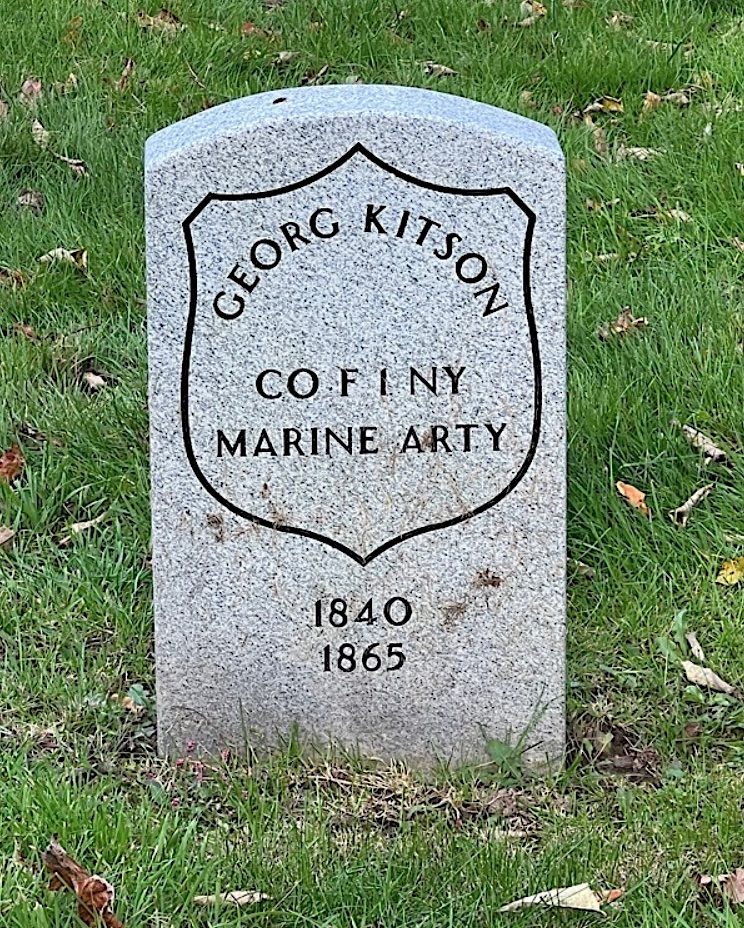
KLEE, HENRY (1842-1914). Private, 1st New York Light Artillery, Battery I. Of German birth, he enlisted as a private at Buffalo, New York, on October 28, 1861, mustered into the 1st New York Light Artillery on January 6, 1862, and mustered out on June 23, 1865, at Buffalo. He last resided at 471 13th Street in Brooklyn. His death was attributed to septicaemia. Section 200, lot 23807, grave 2.
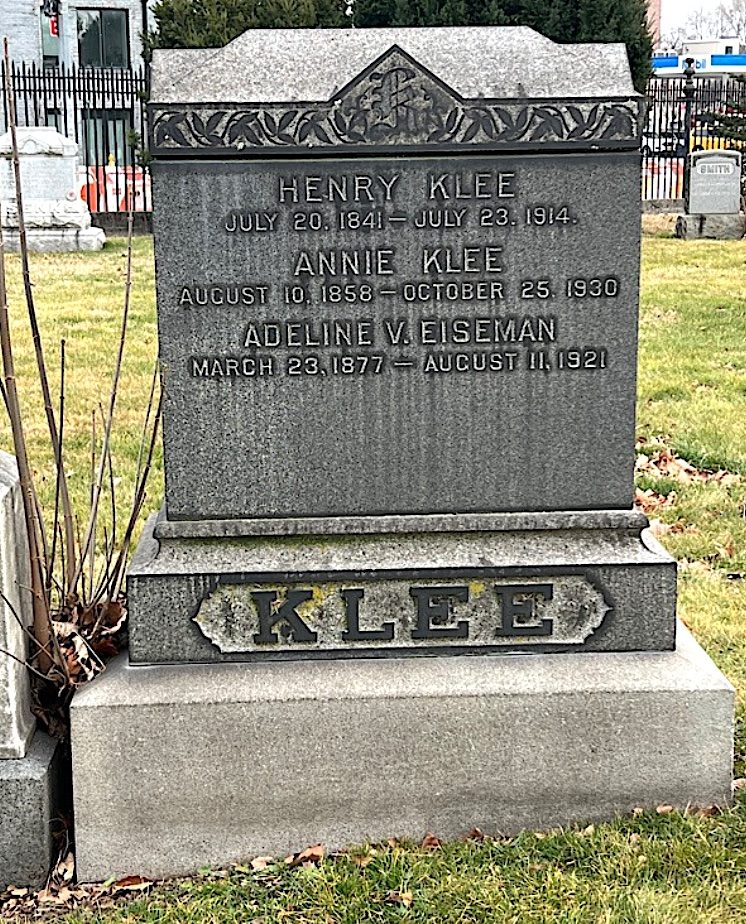
KLEEMANN, ERNST (or ERNEST) (1843-1899). Private, 15th New York Heavy Artillery, Company B. After Kleeman, who was born in Germany, enlisted at New York City as a private on December 31, 1863, he mustered into Company B of the 15th New York Heavy Artillery the same day. He served the remainder of the Civil War, was taken prisoner on an unknown date, and was discharged at Mower Hospital, Philadelphia, Pennsylvania, on May 26, 1865. He last lived in Patchogue, Long Island. Uraemia was the cause of his death. Section 296, lot 31244, grave 2.
KLEIN, HENRY (1827-1896). Captain, 52nd New York Infantry, Company B. After enlisting as a captain at New York City on August 9, 1861, he was commissioned into the 52nd on November 1, and discharged on October 27, 1862. As per his obituary in the New York Herald, he last lived at 9 St. Luke’s Street and was a Freemason. Klein died of Bright’s disease. Section 14, lot 12052.
KLEIN, HENRY (1843-1883). Private, 55th New York Infantry, Company B; 38th New York Infantry, Company K. Of German birth, he enlisted at New York City on February 10, 1862, mustered into the 55th New York that day, and transferred into the 38th New York on December 21, 1862. After the Civil War, he lived in New York City where he died of cystitis. Section 7, lot 22123.
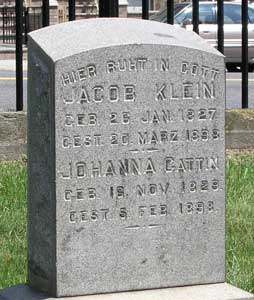
KLEIN, JACOB (1827-1898). Private, 39th New York Infantry, Company B. Originally from Germany, he enlisted as a private at New York City on May 10, 1861, mustered into the 39th on May 28, and was discharged for disability on October 30, 1862, at Chicago, Illinois. Klein last resided at 505 Third Avenue in Brooklyn. His death was caused by pleurisy. Section 143, lot 29136, grave 3.
KLEIN, JACOB B. (also known as SNYDER, JOHN) (1838-1913). Private, 48th New York Infantry, Company H. Klein, also known as John Snyder, enlisted at Brooklyn on October 21, 1863. He immediately mustered into the 48th New York, and mustered out on September 1, 1865, at Raleigh, North Carolina. Klein lived at 228 West 121st Street in Manhattan at the time of his death from pneumonia. Section 114, lot 8999.
KLENOW (or KLINOW), HENRY (or HEINRICH) (1829-1878). First lieutenant, 28th Regiment, Company K, New York State National Guard. Klenow, who was born in Germany, immigrated to the United States in 1850 from Hamburg, arriving in New York on August 16 of that year. His online family tree and the federal census show that he was living in Brooklyn as of 1860. The 1857-1862 Brooklyn Directory identifies him as a window shade manufacturer at 23 Court Street.
As per his military service card, a register of national guard officers prior to 1916, Klenow was a first lieutenant in the 28th Regiment of the New York State National Guard, as recorded by the adjutant general in 1861. That card notes that the 28th was part of Division 2 of the 5th Brigade. Soldier records show that he enlisted as a second lieutenant at Brooklyn on April 23, 1861, was commissioned into Company K of the 28th Regiment on May 11, and mustered out at Brooklyn on August 5, 1861. He was promoted to first lieutenant on June 16, 1863, returned to his regiment and company and mustered out at Brooklyn on July 22, 1863.
The 1863 and 1864 Brooklyn Directories list Klenow as a shade painter at 23 Court Street. According to the 1865 Brooklyn Directory, Klenow was still in the window shade business at 345 Fulton Street. The 1869, 1871 and 1873 Brooklyn Directories report that Klenow was a painter at 345 Fulton Street. According to the 1875 New York State census, he was living in Brooklyn with his wife and two children and was employed as a sign painter. He last lived at 231 Pacific Street in Brooklyn. His death was attributed to heart disease. Catharine (or Catherine) Offerman Klenow, his widow, is interred with him Section 115, lot 8999, grave 277.
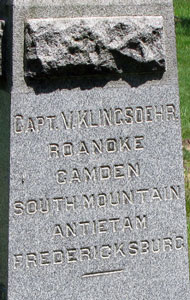
KLINGSOEHR, VICTOR (?- 1913). Captain, 9th New York Infantry, Company A. Klingsoehr is not buried at Green-Wood. His memorial at Green-Wood that lists the battles in which he served is a cenotaph; there is no record of his burial in the cemetery office. After enlisting at Brooklyn as a second lieutenant on April 23, 1861, he was commissioned into Company A of the 9th New York, known familiarly as Hawkins Zouaves, on May 4. On December 24, 1861, he rose to first lieutenant and then was promoted to captain of his company on August 10, 1862. He fought in the following battles: Roanoke, Virginia; Camden Point, Missouri; South Mountain and Antietam, Maryland; and Fredericksburg, Virginia. Klingsoehr mustered out on May 20, 1863. In 1888, he applied for and received an invalid pension, certificate 856,738. According to his pension record, he also served in Company E of the 9th New York. Section 181, lot 10629.
KLINK, FREDERICK (1837 or 1843-1930). Private, 21st New Jersey Infantry, Company A. Klink’s birthplace and birth year are disputed by census data and cemetery records. According to the 1920 census, he was born in Pennsylvania. Green-Wood Cemetery records indicate that he was born in the United States in 1837. However, the 1870 census indicates that he was born in 1843 in Hesse-Darmstadt, Germany. During the Civil War, he enlisted as a private on August 25, 1862, and mustered into Company A of the 21st New Jersey Infantry on September 15. He mustered out on June 19, 1863, at Trenton, New Jersey. The 1880 census states that he had a furniture store. Klink’s application for an invalid pension was approved in 1896, certificate 1,046,554. The 1920 census reports that he was a furniture salesman living on Nostrand Avenue in Brooklyn. He last lived at 86 Halsey Street in Brooklyn. His death was recorded as “genectus.” Section 119, lot 37091, grave 1.
KLOER, CHARLES J. (1844-1898). Private, 133rd Indiana Infantry, Company I. Of German birth and a resident of Vigo County, Indiana, Kloer enlisted as a private on May 17, 1864. On that date, he mustered into the 133rd Indiana, and mustered out of service on September 5, 1864, at Indianapolis. In 1885, he applied for and received an invalid pension, certificate 951,573. His last residence was 63 Clifton Place in Brooklyn. Matilda Kloer, who is interred with him, applied for and received a widow’s pension after his death from a cerebral hemorrhage in 1898, certificate 502,944. Section 135, lot 34967.
KNAPP, GEORGE F. (1843-1912). Rank unknown, 13th Regiment, New York State Militia. According to his obituary in The New York Times, Knapp, who was born in Pennsylvania, served in the 13th New York State Militia during the Civil War. As per his obituary in the Brooklyn Daily Eagle, he was a member of the Veterans’ Association of the 13th Regiment; his comrades were invited to attend his funeral. No further details are available related to his military service. He last lived at 109 Kingston Avenue in Brooklyn. His death was caused by heart disease. Section 194, lot 29221, grave 2.
KNAPP, JAMES EDGAR (1846-1894). Coal handler, United States Navy. A New Yorker by birth, Knapp served on the USS North Carolina from April 7 to April 16, 1864, on the USS San Jacinto from April, 1864 to February 14, 1865, and on the USS Proteus from April 11, 1865 until his discharge from the USS Kineo on May 5, 1865. A manufacturer in civilian life, he last resided at 641 Palisade Avenue in Jersey City, New Jersey. He died on November 11, 1894, of locomotor ataxia and was interred at the present location at Green-Wood on May 23, 1895. Mary Knapp received a widow’s pension from the Navy after his death. Section 204, lot 29052.
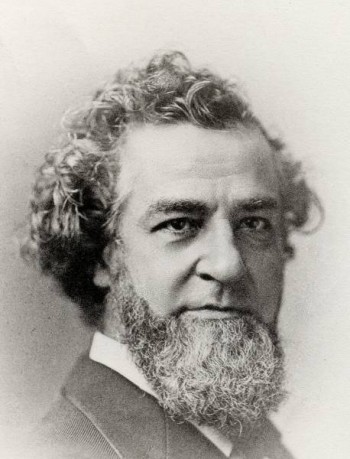
KNAPP, JOSEPH FAIRCHILD (1832-1891). Businessman. At age 16, Knapp, who was born in New York City, apprenticed as a lithographer to Frances (Fanny) Flora Bond Palmer (see), who later became Currier & Ives most prolific artist. As per an unpublished history of lithography written by the lithographer Charles Hart in 1902 and cited in Fanny Palmer: The Life and Works of a Currier & Ives Artist, by Charlotte Streifer Rubinstein, Knapp learned the technique of using rubbing stuff, or tint ink, in printing to create background color. Knapp became a partner in Sarony & Major at the age of twenty-two. That establishment, a major lithographic firm, later known as Major & Knapp, made him a very wealthy man. A prominent Brooklyn businessman, Knapp lived in an elegant house on Bedford Avenue and Ross Street where he held receptions for leading artists and citizens. He began investing in and serving on the board of several insurance companies, among them Union Life.
During the Civil War, Knapp offered soldiers life and other insurances, being the first to do so. Originally called National Union Life and Limb Insurance Company in 1863, Metropolitan Life was started in 1868 to protect Union soldiers and sailors against wartime disabilities due to wounds, accidents, and sickness. He was second president of the Metropolitan Life Insurance Company for twenty years from 1871-1891. According to Philip Lehpamer, who worked as an accountant for Met Life and researched Knapp’s life, Knapp’s mastery of the insurance business enabled Metropolitan Life to survive the Depression of 1873, when scores of insurance companies that started after the Civil War folded. Knapp introduced the idea of selling life insurance in small amounts and collecting weekly premiums in 1879, the same year that F. W. Woolworth introduced its 5 and 10 cent stores. According to Lehpamer, Knapp went to England where this policy was practiced and induced 544 men and their families to immigrate to the United States, eventually selling record numbers of policies from 1880-1885. Although the company experienced some financial difficulties from 1883 to 1886 during its expansion, Knapp put in over $650,000 of his own money and by 1891 the company was financially strong. In addition, he recognized talented employees and nurtured them as they attained leadership positions at Metropolitan Life.
He was honorably mentioned in the History of the Ulysses S. Grant Post #327 for his commitment to veterans and to the Grand Army of the Republic. Though he was encouraged to run for mayor and comptroller of Brooklyn, and the State Legislature, he declined to do so. Before he died, Knapp purchased the land where the MetLife building was erected in 1909 at Madison Avenue and East 23rd Street, at the time the tallest building in the world at 700 feet. A philanthropist with an interest in the arts and music, he last lived at 554 Bedford Avenue in Brooklyn where he and his wife hosted five presidents: Grant, Garfield, Arthur, Cleveland, and Benjamin Harrison. (Harrison spent Memorial Day of 1889 at Knapp’s house.) He died aboard a steamer, La Champagne, after spending time in Europe to restore his health. His son was the head of the lithography business at the time of his father’s death. It is interesting to note that his wife, Phoebe, who is interred with him, is credited with writing over 500 hymns, including the enduring “Blessed Assurance.” Section 176, lot 27752.
KNAPP, WILLIAM A. (1841-1927). Private, 70th New York Infantry, Company K. Knapp enlisted at Newark, New Jersey, on April 20, 1861, and mustered into the 70th New York on June 21. On July 2, 1863, he was wounded at Gettysburg, Pennsylvania, and was later discharged for disability on June 24, 1864, at Newark, New Jersey. He last resided on West 109th Street in Manhattan. Knapp succumbed to heart disease. Section 153, lot 20496.
KNAUSE, BENJAMIN FRANKLIN (or FRANK B.) (1843-1914). Private, 6th Michigan Infantry, Company E. According to his obituary, Knause was born in Waterloo, New York; however, the 1870 census states that he was originally from Michigan. During the Civil War, he was a resident of Calhoun County, Michigan, when he enlisted as a private on July 1, 1861, at Fort Wayne, Michigan. He mustered into the 6th Michigan, also known as the Wolverine Rifle Rangers, on August 20. In this exchange of letters, Knause tells his family how a comrade was killed accidentally and the response of his fellow soldiers.
Holyoke November 24, 1861
Dear Brother Frank,
What on earth is the matter with your pen. I have written over a week ago to you and no answer yet. I feel uneasy about you. Don’t delay to answer this immediately. I fear you have been sick. If I don’t hear from you by next Saturday, I shall write to the Capt. of your company.
I am going into business for myself with one of the best workmen I ever met with. Think we shall meet with success. Our folks are all well as far as I can learn.
Yours in haste. From your affectionate brother, — John W. Knause, Holyoke, Mass.
Baltimore, Md. December 1861
Dear Sisters, Libbie & Lou,
I received your kind letter and was (as usual) tickled almost to death to hear from you & I will answer your anxious inquiries. Relating to my cough, the first thing, my cough died a natural death without the help of Doctor or medicine & I am now as tough & healthy as I could wish to be. I eat all of the rations that Uncle Sam allows and sometimes wish for more. I have just returned from a three weeks tramp up on the Peninsula & I will try and give you a graphic description of all that I have seen & done.
Four weeks ago next Thursday we received marching orders and the following day (Friday) we started at 7 P.M. on the steamer Georgia for — we did not know where. It was a dismal, wet, rainy night but our company had comfortable quarters aboard of the boat. We went down the Chesapeake till we come to a place called the Muds and there we entered the Pokomoke river. The boat run up this river about 50 miles to a little town called Newtown & there we landed. We were in camp at Newtown till Sunday morning when we struck our tents and marched all day. We marched 15 miles that day, took one Rebel Battery without shooting a single gun, & encamped at Oak Hall. There we met with a sad accident.
One of the men that was on guard went to pick up his gun & in picking the gun up, it went off and killed another man in Co. H. His name was Allen Baer. The ball entered his neck just below the ear & cut the jugular vein. It killed him instantly.This cast a sad gloom over the camp. The next day he was buried — the whole regiment went to his funeral. Poor fellow. He is buried far, far from friends & home. He had a brother in Co. H & his brother felt awfully about his death.
Capt. [Smith W.] Fowler was searching for arms & ammunition in a secesh house & the lady of the house opposed him. Says she to him, “Sir, I’m a Lady of Virginia, I would have you to know, & I am for Jeff Davis.” Fowler replied sarcastically, “Madam, I am a gentleman of the U. S. of A. & I am for Abe Lincoln & I am going to search this house” & he searched and found a Rebel Capt, concealed in the garret & he took the Virginia Lady’s husband a prisoner & made him swear allegiance to the U. S. Wasn’t that rich? From Oak Hall we marched to Drummondtown — 23 miles in one day. This time we took two batteries without fighting.
In this letter, Knause discusses his family and his hope for more correspondence. He is also grateful for the water tumbler that he received as a gift.
Baltimore [Maryland]
January 9, 1862
Dear Father,
I received your kind letter today and I was glad to hear from you. I thought you had quite forgotten me, it was so long before I received an answer to my letter. Please write oftener to me. We have not received any pay yet, and when we do get paid, I am going to send what I can spare to [brother] John. He wrote to me to send him all I could spare. He says he has got to raise some money & I think that Karstadt can wait 2 months longer without feeling it and I know that John needs the money & he shall have it — all that I can raise.
I received a letter from [sister] Mary yesterday. She and [her husband] Harlie is well. I suppose you heard that Harlie has bought out his father and gone into business for himself? Mary sent me a New Year’s present for which I am very thankful. It was a pretty Gutta Percha tumbler which shuts together. I carry it around in my pocket and when I want a drink of water, all I have to do is to take it out and pull it just as you would a telescope & drink.
I am glad you told me where [sister] Libbie is stationed for I have wanted to write to her but could not for I did not know where to direct. I suppose you got the package I sent to you with the letters. I thought I could save postage and I did not have a cent or a postage stamp. When I heard from John last, he was visiting at Frankfort. He wrote that all of the folks were well but Aunt Lucy. She was quite unwell. Uncle Lambert is keeping tavern in Frankfort. I wrote a long letter to Grandpa Wyant today. I got to thinking of him and I thought I would write. Maybe he would be pleased to hear from me. Do you remember Angeline’s husband? …. [end of letter missing]
In this letter to his sister from New Orleans in January 1863, Knause thanked her for the food gifts that he received. He described his poor health at that moment and his reflections about his family and the changing of the guard in Louisiana when Major General Benjamin F. Butler was replaced there.
Camp Dudley New Orleans, La. January 28, 1863
My Dear Sister,
The box you had the kindness to send to me I received yesterday and for the things, accept my grateful thanks. I cannot do more to pay you now but perchance the time may come when I can return in some way your kindnesses. You don’t know how much good those things are doing me. Everything (but the doughnuts in that cunning little teapot) kept nice. The doughnuts got musty. The large cake kept nicely and was not bruised a particle. And the housewife you made for me is handsome and I think a great deal of it. Mary’s peaches were splendid and the jelly, cake & cookies were tip top. The dried beef and butter are not a bit behind. The tea came very acceptable as I cannot go the coffee that they make here. The apples and popcorn made me think of home. I am very thankful for that Testament from Coz. Mary. It was just what I wanted. You don’t know how thankful I am to you all.
You see I have been so sick that I could not stomach the things they cook here. If I did eat a piece of fried pork or drink a cup of coffee, I would have to throw it up again. But now a little tea and some crackers and butter go first rate. Indeed, I thank you ever so much. But enough of this.
My health continues to grow no better very fast and sometimes I feel so weak and feeble that I can scarcely raise myself. I have got a bad cough. I caught cold and it settled on my lungs and I just cough sometimes so that I cannot sleep. I feel a good deal better today than I have felt in a good while, and I hope I will soon get well. The Doctor wanted me to go to the hospital but I did not want to go. I was afraid I would get low-spirited if I went there. As long as I can keep my spirits up, there is a prospect of my getting through. But just as soon as I allow myself to get low-spirited, why I will get down sick.
When I get so that I cannot write for myself, I will find some way of communicating the same to you immediately. But don’t worry about me till you hear that I am sick abed and in the hospital. I will write as often as once in 2 weeks to you & Mary or John. I would write oftener but it so unhandy to write here that I almost hate to write.
We were all sorry to part with our old commander, Major General Benjamin F. Butler. I think he has done better than any other General in the field. The people of New Orleans feared Old Ben but they loved him, and while he was here the citizens kept a civil tongue in their heads. Now it is different. Since the arrival of Banks, the citizens are as saucy and independent as though we were not here. When Butler was here, they did not dare to come out in the street and hurrah for “Jeff Davis.” If they did, they knew that they would go to Fort Jackson for 3 years, and that was serving them just right. I wish he was coming back to take command of the Department of the Gulf.
I got a letter from Father with his and Mother’s and the baby’s picture in it. He was getting along finely then and his health may continue good and may he enjoy many years of happiness yet on earth. I do love him so much for he has been a good and noble Father to us. When I hear some of the boys tell how they have been whipped and abused at home by a drunken Father and deprived of the privilege of going to school or to Church, I always think of what a kind Father we had and then my thoughts will wander off and sometimes grow very bitter when I think of how I repaid his love and kindness by being as ugly as sin could make me. Ah, Libbie, if I could only have those younger days to live over again with my experience. I would lead a far different life. It is with me as with a certain writer — “experience has made me a sadder but yet a wiser man” — and during the remainder of Father’s life, I shall strive to make it pleasant and render him happy as I can. “Man proposes and God disposes.”…
Knause wrote this letter to his parents from Camp Kenner in Louisiana on March 31, 1863. The property, listed on his letter as the Sherman Plantation, had formerly belonged to Duncan Ferrar Kenner, a sugar planter, politician and chief diplomat from the Confederate States of America to England and France in 1864. After the capture of New Orleans in 1862, most of Kenner’s land was confiscated and his slaves were freed.
Camp Sherman
Kenner’s Plantation March 31, 1863
My Dear Folks at Home,
Tonight I again find myself seated to write you a few lines. I have just finished a letter to Libbie and I have got one more postage stamp left and I have come to the conclusion that you want to hear from me worse than anyone else and so I am going to try and tell you how I am getting along. I am pretty well and in good spirits and seeing that I can’t get my discharge, I am going to get well and do the best that I can. I hope that you will get along all right. I am doing first rate but I must close for tonight. — Frank
[April] 1st. I had to close my letter rather abrupt last night for my candle went out and left me in the dark. Today I have been fishing but I did not catch any fish. I left the Hospital on the 29th and came up to camp. Our present encampment is located 13 miles from New Orleans at a small place called Kenner. The railroad lays on one side of our camp and the Mississippi river on the other side. The cars go to the city twice a day and boats are going up and down all the while on the river, but notwithstanding all of these things, it is very lonesome here.
All of our regiment have gone up to Manchac Bayou on an expedition (all except a few sick ones left here in camp). They have had a fight with the rebels and the latest news we got from them was rather dubious. Two companies of the 177th New York Regt. were captured by the rebels and one of our iron-clad gunboats. Our Colonel is in command of the expedition and if he don’t look out he will get captured with his whole Brigade.
Blackberries are plenty and as big as a good sized plum. We can buy a quart of them from the Niggers for a piece of bread or a piece of meat and I tell you, they do good. I wish that I could send you some for your supper, but of course that is an impossibility. Alligators are plenty and the boys go out hunting them every day. I myself have eaten a piece of alligator tail but I must confess to you that it is not a very desirable dish. Our boys killed one last week and eat him. Corn is up a foot high and Irish potatoes are as high as the corn.
We are camped in a field where the white clover is up to my knees. All the rose bushes are in blossom and in fact, it is just like summer here now. There are 5 large plantations here in a row that have been confiscated and they are now worked by free darkies and Uncle Sam pockets the profits. This is as it should be and I like to see them go into it in this style.
The Inspector General says that he is going to move the Michigan 6th Regiment down to the city of New Orleans when they come back. I for one think that it would be healthier for us all if they would keep us here in the country where we could get all of the fresh air that is stirring. Still if we go to the city, we will have good warm quarters and we will get better living and have a better chance to get our letters and to send letters home.
Give my respects to Mr. Grant’s people. I want you and Mother to write to me real often for a letter from home is a cheering thing to the poor soldier and there is no one on earth that I love to hear from so much as I love to hear from you. You must not look for a letter from me again very soon for my postage stamps are gone and I can’t say when I will get any more. We have not got our pay yet and we don’t expect it till we get our 4 months pay. I guess I will have some then to send home to you. Butter is 50 cents a pound. Eggs 75 cts. per dozen. Cheese 30 cents a pound. Potatoes 8 cents a pound. Apples 5 cents apiece and every thing accordingly.
Well as it is getting late I will close. Give my love to all with a good share for ourself and Mother and little sister Carrie. You must write to me as often as you can. Tell Frank Sweet that I have written twice to him and he has not answered me. My love to you & Mother. Kiss little sister Carrie for me and please do write to your affectionate son, — Frank B. Knause
On June 8, 1863, Knause wrote to his sister from Baton Rouge, Louisiana:
My Dear Sister Libbie,
Your kind letter with Mary’s enclosed came duly to hand, and I was very glad to hear from you once more. I am still at Baton Rouge — not very well — but in the best of spirits. Our regiment is at Port Hudson fighting Rebels but I don’t think they will stay there much longer. I think Port Hudson will fall long before you get this letter and then I think all of the Western Regiments in this Department will join Gen. Grant’s Army leaving the Department of the Gulf for General Banks and his Eastern men to take care of it.
There is nothing to be seen in Baton Rouge but sick and wounded soldiers and paroled Rebels. I hope this war won’t last much longer for I want to come home. Won’t we have such fun? You & Louise & Frank Sweet & Frank Knause. We will have our boating parties, hunting, fishing &c. etc.
I don’t know but I think I would like to go North of Marshall 20 or 30 miles and buy me a place and build a nice house and settle down near to Father. You know he is getting old and will need someone to take care of him in his old age. We must always help one another and try to do as we would be done by. I feel as though I would get through this war all right and get home all right and if I do, what a great benefit it will be to me. Now since I have been out into the world and learned to think unselfishly, I can see many places in my life where I have done very wrong, and I find upon sober reflection that in many places where I have blamed others for doing wrong, it was me that done the wrong. The more I think of my past life, the more fault I have to find with myself. I have done wrong all my life and now while I live, I must try to rectify my many faults. I have read my Testament most through and when I finish that, then I shall take the whole Bible and study it. I think every man had ought to study the Bible and live as near right as he can and not pick it to pieces to patch up a doctrine that will suit him. I believe in the whole Bible though there is some parts that I can’t understand and I believe that those parts which we can’t understand were not made for us to quarrel about. But enough sermonizing.
Baton Rouge is not so healthy as it used to be last year. The Small Pox has made its appearance here but I think the doctors will get that stopped. I don’t fear it much for I have been vaccinated. There is not much fever here and I guess we will have a pretty healthy summer if nothing happens.
You talk just as though you thought I was crazy to get married but you don’t know Frank Knause if you think he is anxious to get married. Why how in the world could I get married? I have no way to support a wife and then again, even if I had a way to support a wife, I know of no one who would suit me. I like Jennie Beecher very well (or at least I used to) but she is too much of a doll and then she is too gay to mate with a person of my moody disposition. Such a woman as I would have — one who would make me happy — would have to be possessed of the following qualities. She would have to be amiable (no scolding allowed), Lady-like, gentle (not tame, a little spirited), a good singer, well educated (not a regular blue), neat in person and about the house. A good cook and a smart worker. Always happy (one that don’t know what the blues are) and a good Christian &c, &c.
You see I would be hard to suit and you can make up your mind that Frank Knause, like his illustrious brother John W., would be glad to get married if he could ever find one who suited his taste exactly. But he may live until he is 40 years old before he can find such an one. And when I do find one of that kind, I will immediately begin the siege and if she ever surrenders to me, I will invite all of my friends up to see me spliced. Don’t fear for me Libbie. I will let you know always in good time and listen to any suggestions you may make and we will drop the subject of marriage till next time.
We expect a cavalry raid here and if the Rebel Cavalry do come, they will get whipped. Give my love to all who may think enough of me to inquire. I have not received John’s photograph as yet. If he has not sent it, make him do it. Love to all & write soon.
Your affectionate brother, — Frank B. Knause
Knause writes to his sister Libbie and describes both his feelings about being a soldier, his desire for the freedom of daily life and his hopes to improve his education.
[Partial Letter to Libbie from Port Hudson, La., 13 August 1863]
…make a decent looking letter if I try ever so hard. Now today I feel in fair spirits and my writing looks accordingly. But when you see a letter all blurred & blotted from me you can make up your mind that I don’t feel in very good spirits. I don’t know anytime when I sit down what I will write about that will interest any of you but after I begin a letter I write just what comes into my head first.
Well, don’t you think that we have at last got the Rebels in a tight place? You know that the Union Army has been likened to a huge Anaconda which had its victim enclosed in its coils and was about to crush out all life. Well the great Union Anaconda is tightening and the vaunted Confederacy lies crushed and bleeding at the mercy of the conquerer — the huge snake which they designate Yank. If our generals in Virginia were only of the same stamp as General Grant or General Rosecrans and would follow up the advantages they have gained, we would soon put the treason down and send their leaders to the place reserved by Satan for traitors like them. When we think of the amount of misery and suffering they have caused, why it seems to me that an eternity of suffering and torture will scarcely be enough. But then an eternity — what is it? Forever and ever. Human minds are too small to grasp such a vast — such an awful subject. Where is thought leading me to? But a moment ago I was writing about war. My thoughts like everyone else’s will wander from one subject to another.
One thing I always love to think about and that is of you and Mary and John. I am so glad that all of my family — or our family — can read and write and have a pretty good education. Now my education is the poorest of any in the family but Mary’s and she has as good an education as most girls have. And like me, she might have had a better education — but no! she knew more than Pa did and she thought she was abundantly able to go through life with what she had.
I think some of going to school after I get home and going through a course of study. I find myself deficient in Arithmetic, Geography, and Grammar, and I think one year of hard study will bring me around all right. I study evenings now. I have borrowed an Arithmetic & slate and have begun at the Tables of Weights, measures, &c. and I am going as far as I can alone. And if I can find anyone to teach me, I will go clear through the book and I intend to learn it too.
I am in tip top good health at the present time and in very good spirits. I feel very much encouraged when I think how fast my term of enlistment is expiring — only 12 months and 7 days more and I will be a free man. Free to do as I please and under no obligation to go where I am ordered. I will be as good then as Lieut. Wm. H. Dickey or any other shoulder strapped gentleman of that kind. Oh, I do so long for that day to come when I can cast aside my soldiers clothes and walk up and down the street without going to a certain brave Capt. and asking his gracious consent. I love my country but not enough to overlook the airs put on by these men who have been raised to their present positions by the Privates and who now betray the confidence placed in them by treating Privates worse than dogs. But their race is nearly run and they will be kinder and more considerate as our time passes for they know it won’t do to use us too hard for there are some men who won’t “forget and forgive.” But enough of this nonsense of mine. It won’t interest you.
Navigation is fully opened and boats run up and down the [Mississippi] river at all hours night and day. My comrade has got a furlough for 60 days and he starts for home on the next boat up the river and I am going to send this letter by him. He will probably mail it at Cairo or St. Louis. He is going to see Father and take some things from me to him. I think I wrote you of his getting wounded here at Port Hudson. A piece of shell struck him in the left arm below the elbow making a Compound Commutated Fracture — a frightful wound and very dangerous. His arm was marked by the Doctor for amputation but the Surgeon of our Regiment told him he would try to save it and his arm is now most healed up and entirely out of danger. His name is Freeman Upham.
Well, Lib, I must close my letter and go to writing to Father. Write to me soon and write me as long a letter as this and I will be satisfied. Give my love to all of my Aunts & Cousins. Tell John to send me some Gold pens if possible. Much love. Write soon & a long letter.
Knause wrote to his sister from his camp at Port Hudson, Louisiana, on January 24, 1864:
My dear Sister,
I suppose it is about time I was writing to you again as I have received two letters since writing you last. I have been thinking what I could write about but I can think of nothing — only thought. Last evening I sat gazing out of my window and while thus occupied, I fell into a rather mournfully pleasant train of thoughts. The landscape which my eye rested upon was one of extreme beauty (to me at least). I was looking across a dark and rugged ravine towards the Post Ordnance Depot which stands upon the opposite hill. To the rear of the magazine and on the outer edge of the hill is a dense wood which formed a very pretty background. On this side of the magazine, beneath the shade of a venerable Magnolia “whose leaves were as green as summer ever saw Maple leaves in the North,” stood a single tent. On one side of this tent at a little distance from it, lay “piled up in pyramidical piles” huge cannon balls and shells. They having been quite recently varnished black, the rays of the declining “God of Day” made them glisten in a very agreeable manner. This side of the piles of balls there burned a bright fire by which a soldier, whose original home is supposed by me to have been Afric’s sunny shore, [was] leaning upon his gun seemingly deep in the mysteries of thought. There I have given you the scene as nearly as I possibly can and in flowing language. But honestly, it was just such a scene that set me thinking, and what do you think I was thinking of? Well, I was thinking of the good old time of yore called up in all probability by reading over your letter. Engraved indelibly upon the retina of memory’s eye is the good old scene of home on a Sunday afternoon. I can never drive the scene away from me, nor do I wish to. I wish I could tell you all my thoughts but it will only take a deal of paper and an extra exertion while in the end it would not amount to much. I have got into such a habit of thinking that I can hear no one speak while I am thus dreaming away my time, but I don’t have much time to dream away now days.
I have been very busy — writing and drawing ammunition around the works for General [George Leonard] Andrews has got a “big scare” on and I am flying around in a hurry to get things prepared so as to give the Rebels a good warm reception when they come. I don’t think — or I mean I do think — that the Rebels will never try to retake this place. If they do come, they can never come in unless they come in as prisoners. We have got things fixed admirably and I predict an awful slaughter of Rebs if they try us. I can’t think of anything to write tonight.
I am glad you are all well though very sorry to hear of Aunt Carrie’s loss. I hope you had a very good time eating your Christmas turkey. I believe I wrote you of our loss — chickens, I mean. Poor Biddies — their fate still rests in oblivion. But as it is getting late tonight and my candle is just about expired, I will finish in the morning when I will in all probability have something more interesting to write. Good night. — Frank
Knause subsequently re-enlisted at Port Hudson, Louisiana, on February 23, 1864. He wrote a running account of his return to his regiment after furlough (which he mailed home). It is excerpted below. This segment, in its original spelling and usage, begins at the site of a train wreck:
….We were lucky in their being hitched on ahead of us. I wandered around in the dark to find out the extent of the damage and loss of life [in the train wreck]. I found two men killed. One man was horribly mangled and plenty hurt in some way. The cars that contained the Brass Band stood up on one end and the appearance of the Band boys when they emerged from the top of the car where we cut a door for them. I say their appearance was ludicrous in the extreme. Their instruments were all banged up and they looked decidedly used up. The boys that were killed were brothers — veteran soldiers — and were just returning to their regiment from their Veteran Furlough. We built large fires on both sides of the track and pretty soon the wreck was begun on. I went back into the car and got settled down and had a good sleep (I suppose).
Monday, May 3rd, 1864
Got off from the scene of the accident by ½ past 9. Arrived at Centralia [Illinois] about 3 o’clock P.M. My stomach feeling low. I paid the sum of 50/100 in greenbacks to get it put in order. Mailed a letter to Libbie and Father. A man had his leg cut off by the cars just below Effingham. Left him there. He did not belong to ours (6th). Passed some very pretty little towns about dark. It snowed for 2 hours after we had started.
Tuesday, May 3d, 1864
Arrived at Cairo [Illinois] at 4:30 A. M. Wrote to John and Louise. Went down town, mailed the two letters, bought me some household furniture in the shape of a tin cup for the purpose of coffee. We were ordered from the cars to some barracks down town. I did not march down with the company but staid with the baggage. At 10 o’clock A.M., I slung my knapsack on my back and started down the railroad track. It was a terrible hot day and I sweat like a good fellow under my load. After walking about a mile or more, I seen a lot of soldiers over in a cattle pen. I met a man, asked him if he would be kind enough to direct me to the barracks where the 6th Michigan were quartered [and] he pointed to where the cattle pen was. The simple gesture of the man spoke eloquent volumes. Barracks? Bah! Pig sty. Never-the-less, Frank, you must come to a pig’s level. What would the elegant Miss — say if she were to see me wallowing. Stole some lumber from a lumber pile that was handy and built me a pen — a new pen on the remains of an old one. Phoenix like it rose from the ashes of the old one.
Wednesday, May 4th, 1864
Wrote a letter to Billie Sweet and one to Gillie Smith. Spent the last money I had. Yea, the last “picayune” slid for provisions. Spent a miserable day wandering around from point and I have come to the conclusion that Cairo in Egypt is a gay place for mud. The principal crop raised is speculators. Thieves seem to thrive but it is a little too near Kentucky for many Niggers. At 4 o’clock P. M. I hailed the appearance of the [steamboat] Leviathan with joy. At 4:30 P.M. we were ordered on board and assigned to the Hurricane deck. It was sunset and a gorgeous one at that. A few clouds overhead that let down some pattering rain drops. There I stood drinking in all the rich beauty of the scene. The river boats were plying about busily, the cars just starting out on the levee, men shouting here and there, wagons prattling over the paved slope of the levee, peddlers everywhere. Above was a rainbow arching over from one side of the river to the other like some huge culvert, joining seemingly the busy shores of Illinois with the green shore of Kentucky.
Thursday, May 5th, 1864
Left Cairo last night just after dark, stopped at New Madrid this morning for wood and to let off a passenger. Passed Fort Pillow, the scene of the massacre, at 6 P.M. It has a very desolated appearance. Passed four men standing on the river bank. They waved their handkerchiefs for a boat but their were discovered to be dressed in Rebel uniforms with guns and the Capt. of the boat would not stop. Probably Rebel deserters. A very pleasant day only a little breezy. The trees are all green and present quite a contrast to the snow storm we had in Illinois the other day. Arrived at Memphis at 12 o’clock tonight.
Friday, May 6th, 1864
Got up pretty early this morning and went up into the City of Memphis for a walk. The square looked very pretty. A fountain was spouting up jets of water and about 200 squirrels were playing around fearlessly. They were very tame and looked and acted as thought they belonged there. Two or three deers and a young fawn completed the list of occupants. After refreshing my tires senses enough with the scene, I returned to the boat and to breakfast. Did not leave the boat again although Lieut. [Charles] Watson very kindly offered to pass me off. Left Memphis at ½ 11 o’clock A. M. Landed at 2 o’clock P.M. to wood up. The man who owned the wood pile only asked $11 per cord at this place. Captain Craig, Officer of the Day, put a Secesh woman ashore for wearing a Rebel badge and singing “Hurrah for the Bonnie Blue Flag.” Wooded up just above Helena [Tennessee]. Arrived at Helena at 9 o’clock P.M. Put ashore a lot of freight and passengers. Went on guard as a private. Was on the 3rd Relief.
Saturday, May 7th 1864
Left Helena at 1 o’clock last night. Got to White River Landing at 7 o’clock A. M. While we were “tied up” here at this place. 19 Rebel deserters came in and gave themselves up to the gunboats. They were from Forrest’s guerrillas. Left White River Landing at 9 o’clock A. M. Passed another group of Rebel deserters about 30 in number. They signaled for a boat but our Captain would not stop. Stopped just at dark and put an Officer ashore. Borrowed $5 of [Charles L.] Kappes [who later accidentally drowned at Skipworth Landing, Louisiana, on July 25, 1864].
Sunday, May 8th 1864
Arrived at Vicksburg [Mississippi] this morning. I did not get off from the boat. The Captain and Mate of the boat were arrested for overcharging a little Assistant Surgeon who was going to his Regiment (the 4th Wisconsin). The Captain was fined $100 and had to pay the little Surgeon back what he had overcharged him. Crossed the river and landed below Vicksburg and opposite from it at the mouth of the great canal that was to have made Vicksburg an inland city. This canal is sometimes called Williams’ “folly.” Took on a lot of wood. Left this landing at ½ past 11 P.M. At 3:30 we passed the former plantation of the Arch traitor Jeff Davis. I never looked upon a lovelier place. It is a little “paradise.” It now belongs to the U. S. Govt. and is carried on by contrabands. Passed Grand Gulf at 6 o’clock P.M. All is desolation about Grand Gulf. Some two years ago [May 26 1862] when coming down from Vicksburg on a transport, our regiment was fired into at this place by a Battery of Rebel Light Artillery so of course this place was interesting to us. Passed Rodney just at dark. It is a very pretty looking place with its huge bluffy background. Would make a very pretty landscape for a painter to practice upon.
Monday, May 9th 1864
Passed Natchez [Mississippi] sometime in the night last night. We arrived at the mouth of the Red River early this morning just as the sun was rising. Our boat stopped in the stream and hailed the Flag Ship. Asked them to send on board and get dispatches. A tender from the Black Hawk came in answer to one hail and took the dispatches and we went ahead. Passed Bayou Junica at ½ past 6 A.M. Bayou Junica is the place where there were so many of our boys taken prisoners November 8th, 1863. They were up there after corn and cattle when the Rebels came down upon them and took them by surprise and captured 20 men from the Regiment — 6 men from our company.
The trees begin to look natural with their drapery of Spanish moss. We arrived at Port Hudson, La. about 10 o’clock A.M. and were going to run by without stopping. When we came within range, however, we were fired at which was equivalent to saying to us, Land and report. We did not stop, only a moment. I shook hands with [Sherman] Ainsley and Bob Pierce [of Calhoun county]. We backed out into the stream and the boys on shore cheered lustily for the Veterans and we cheered back again for the Wide Awakes as they styled themselves. Landed at Baton Rouge just above the city and took on wood. Left Baton Rouge at 4 o’clock P.M. We passed some of the finest plantations in the south. Saw two large fires just after dark.
Tuesday, May 10th 1864
Arrived in New Orleans about 2 o’clock A.M. Went to bed after we got there. Got up early in the morning and went up in the City. Came back at noon and got my dinner. Went up after dinner on patrol after all stragglers from the Regiment. Found about twenty of the boys and sent them back. Went up to Paul Millers Brothers Beer Garden. We cracked four bottles of old port and rested a little while. Finally went back to the Iberville and found our regiment all on board — recruits and all waiting for us. Started at 4 o’clock P.M. and raced till we got clear above the city with the steamboat New Orleans. Before dark, we had left her out of sight. Went to bed at dark on the Hurricane deck. After I had laid down, it rained like everything but I took it cool. Oh how I did pity some of the recruits. They looked as though they were thinking of home.
Wednesday, May 11th 1864
This morning is a very cold and uncomfortable morning. Arrived at Baton Rouge at 10 o’clock A.M. Just stopped and that was all. Saw some cabbages for sale also some radishes &c. Passed the Jennie Rogers opposite Prophet’s Island. Arrived at Port Hudson at 12 M. Got off at about 2 o’clock P.M. Marched up to our old Company Camping ground and unslung my knapsack. Went in with Homer Olds for the present. Recruits were assigned to the different companies. Went on guard on the 3d Relief. My post was at the lower Magazine near the river. My orders were to allow no one near it that was smoking and allow no one to enter with their boots on. Sam told me that he seen Frank in the city. He said that she wanted to see me very much. Am sorry that I did not know it sooner.
Thursday, May 12, 1864
Yesterday when we got here I received one Valentine and two letters. The Valentine was from Egeria. I like to froze on guard last night. While Freem[an Upham] and I were engaged in building our bunk, Captain came up where we were and asked me if I had been on guard. I told him I had. Well, he said, you need not go on again. You may go down and help George on the Muster & Pay Rolls. Of course I was not sorry to learn that I was to do no Private’s duty. The cavalry come in tonight and reported the Rebs coming in. A man was drowned in the Mississippi this P.M. He was a recruit [Gardner Lilly, age 21]. Wrote to Jennie O’Hee, Frankie Greene & Libbie.
Friday, May 13th, 1864
Traded my gold pen to James Johnson for his. Was detailed for guard but Captain said I should not go on. Went over to headquarters and got some Muster and Pay Rolls. Worked on the rolls most all day. Wrote to Kate Sweet. Mary Garrison “Egeria” and Louise. Mailed 7 letters tonight. Felt unwell most all day so I took a good dose of Physic tonight.
Saturday, May 14th 1864
Sick all day. wrote to John and Father and George White. Bought twenty postage stamps of Will Blashfield and have $1 worth beside.
Sunday, May 15th 1864
Went out on inspection with my knapsack packed and slung on my back. After inspection, Capt. come and delivered the keys to the Magazine to me and told me that my duty would be to take charge of the Magazine and all ordnance & ordnance stores appertaining to Co. E. I immediately took an inventory of ammunition and ordnance stores for which Capt. S. Cogswell, Co. E, 6th Mich Vols. Heavy Artillery is responsible. Reported to him the entire amount. Was ordered to draw twenty rounds for each of our Howitzers. 1 twelve pounder & 1 twenty-four pounder. I drew from the Ordnance Depot (Post) therefore the following ammunition. 18 rounds canister, 24 pounder Howitzer and 24 rounds canister, 12 pounder Howitzer. Filled shell in the Magazine the remainder of the day. Got a big spot of tar on my nice pantaloons.
The Rebels came up as far as the Citidel last night, shot three Negroes who were on guard there, captured twelve Negroes and their commanding officer, burned down Doctor Noyes’ Saw Mill and killed a number of white men who were working for him. All this was done right under our noses and the Nigger General would not allow us to send them our compliments in the shape of a few shells. Heavy skirmishing going on about one mile from the powder works. Rumored that we have the Rebs surrounded.
Monday, May 16th, 1864
Spent the last money I had for pickles & candles. Got a letter from Billy Sweet. Answered it immediately. Turned all the cartridges in the magazine to prevent the powder from caking. Swept out the Magazine. Went back to my quarters and laid down for the rest of the day. Received a letter from “Egeria.”
Knause wrote home from Fort Morgan, Alabama, on September 7, 1864. He expresses his feelings after serving as acting sergeant major:
My dear folks at home,
I received a letter from you just after I had sent you my last which was about a week ago. I was very much surprised to learn that you had not received more letters from me. I have written to you as often as once in every two weeks and sometimes oftener than that but I cannot write so often now for the following reasons. My postage stamps have most give out and we are not paid & no money in the Pay Department at New Orleans to pay us so I can get no stamps — only what I beg from the boys. My second reason is no time. I always have had plenty of time but for the past week or two, I have been up to my eyes in business. You see the Sergeant Major was taken sick about the time the monthly press of business came at the Adjutant’s Office and there is no one in the regiment who understands the business but Frank. Well, I went to help them and done all the work of a clerk for the company at the same time. I tell you, you can not imagine the perplexity and trouble, but I have mastered it all and I have got through the worst press. I like to be just as busy as a bee for when I am busy & my mind is occupied, I am quite happy.
Well, here we are at Fort Morgan and I guess we will stay here for one while. We have been ordered to garrison Forts Morgan and Gaines and I guess we will garrison Fort Powell also. I cannot say truthfully that this is a pleasant place, but I like it very well because it is very healthy. Far as the eye can reach in one direction stretches the ocean & in the other direction, I can see nothing but white sand banks in drifts, like I have seen snow drifted in the North. Along down the beach are stretched soldier camps in front of our camp and on the extreme point of land that extends into the Gulf is Fort Morgan. This fort has been the scene of five battles. It was built by the Spanish a great many years ago. It was captured from the Spaniards by Frenchmen, then retaken by the Spaniards. In 1833, the Americans built the present fort which was taken by the Rebels at the commencement of this rebellion and now is retaken by our gallant Navy and Army. We do not apprehend an attack from the Rebels. For my part, I feel just as secure here as I would at home. We have not moved into the fort yet but expect to move in as soon as the rubbish is removed.
I am in splendid health and pretty good spirits. And now I want to tell you something that I don’t want you to tell anyone but Libbie. I am acting Sergeant Major and have helped the Colonel out of a bad place and I have been very highly recommended to the Col. [Charles E. Clarke] for a commission. My recommend was Capt. [Sylvester] Cogswell. The Col. has not said yet whether he would recommend me to the Governor of the State but Capt. is working to gain this end. Capt. is my firm friend and I know he will do all for me what can be done. Now I have only a faint chance for promotion and can not hope for much. Therefore, I don’t want it mentioned for I may be disappointed. Capt. told me that he had forwarded a recommendation to the Governor of the State but his recommend will not get me a commission without being supported by the Col. and he [the Col.] thinks that he ought to promote his sergeants first. I think I will get a commission before the war ends anyway.
We have Rebel news direct from Mobile which says Atlanta is taken and Gen. Sherman has moved on beyond that place to Jonesborough or Jonesburg. Write to me as often as you can. I am going to buy John’s share of the place. Will you give me an estimate of what you think he has expended on it. Much love to Mother and Uncle Adam’s folks. Remember me to Grandma. Love to Libbie and all the rest. Kiss little Carrie for me. I shall send home some money to Libbie as soon as paid. Also some money to help you along.
I remain as ever your affectionate son, — Frank B. Knause
Knause wrote to his family from headquarters at Fort Morgan, Alabama. He describes his feelings about the life of a soldier and some excitement at his camp caused by drunken Union sailors from the USS Chickasaw, an ironclad that participated in the Battle of Mobile Bay.
Fort Morgan, Alabama
January 15, 1865
My dear folks at home,
Your letter of Dec. 28th 1864 has just come to hand and I am very happy to hear from you to hear that you are rid of that pest — Fan Mensch. You must have had a letter from me long before this time. I am well and I have never thought of re-enlisting in the Regular Army. A soldier’s life is a dog’s life at the best, and I know it. I shall stay my time out in my regiment and then, if my life is spared, I am ready to come home and begin life. So far my efforts have not been crowned by success but then I have not been so much of a spendthrift as some of the boys that I know of. I might have done better since I have been a soldier and I hope to do better in future.
About the breeding mare, I am glad that you will keep one for me because I want one, and as soon as we are paid off, I will send you what money I can spare to buy one. My expenses here have amounted to over $60.00 since last pay day. I have indulged myself in several unnecessary comforts which I would not have done if I had thought that I would stand in need of such much money. I bought myself seven yards of Navy flannel to have a coat made. The flannel cost me $7.00. The cutting, trimming, & making costs $4.00 more. Thus you see for one article of comfort, I pay $11.00. I buy myself a pound of butter once in a while and pay 80 cents for every pound. Occasionally a mince pie for 40 cents, a plug of tobacco $1.50. A pair of shirts, which cost me $8.00. Washing at the rate of 30 cents per week, and besides all these little expenses, comes my mess bill &c. If I had lived entirely on government rations and not bought myself any clothing decent to wear, I might have been so much ahead. I manage to save my Bounty every time and I shall try and save some of my wages.
I expect a better place soon where my wages will be $26.00 instead of $16.00. The only trouble with me is this — when I am around among the officers and coming into daily contact with them, I will be looking as neat as possible, and even soap costs money. Well, the Tattoo is beating and I must say good night and finish in the morning. — Frank
Monday evening, January 16th 1865
Have passed a very agreeable day today. I had an invitation to go out to Sand Island for a pleasure ride. Capt. Stark and a few of us (two more beside myself) went. I enjoyed the trip very much because I am confined to the office so closely that the rolling motion of the boat was delightful.
Last night we had considerable excitement here in the Fort. It was occasioned by a part of sailors from the monitor Chickasaw. The sailors got drunk and went to shouting, fighting, singing &c. and when Col. Clark ordered them to desist and go on board their boat, they refused and gave him saucy words instead of obedience. The Provost Marshal then ordered our guard to arrest the ringleaders. The arrest was made but it took some stubborn blows to force them into the Guard House.
After they got in to the Guard Quarters, they drove the guards out of the house and threw bricks at our boys. Human nature could not stand such abuse, as the sailors heaped on our boys, and the Officer of the Day finally gave the order to “load at will” and fire upon them when they got too saucy. At the first opportunity, our boys put a couple of bullets in amongst them and after that they were quiet enough till all at once they had a big fire blazing on the floor of the casement and there was a ton of powder just in the next casement to them & connected with this room by a wooden door. We were thus placed in jeopardy by a lot of drunken, foolish men. The fire was quenched before any damage was done. At 12 o’clock in the night, the officers of the Chickasaw sent off a Guard of Marines and we sent the unruly sailors aboard.
Well, Pa, I have written you all I could think about. Now I want to speak of [sister] Libbie. As soon as her school is out, she must go East. No use of thinking about her staying in Marshall any longer. As long as she stays there, she will be subjected to all manner of mean things, and if she is removed now she will feel much better. Since I have heard of this very last attack on her, I have been nearly crazy. I can bear sickness, fatigue &c. very well, but I cannot bear the thought of you at home suffering. I have written to John telling him all about Libbie’s affairs and I asked him to advise her. I am so far away that it is almost useless for me to attempt to advise her anything.
Well, I must close. Give my love to Mother & Libbie. Kiss for Carrie and tell her Frankie will come home as soon as possible. Don’t fear that I will re-enlist in the Regulars — I can’t see the point — not for forty furloughs and fifty bounties on top of them. I am all right. If I live to get home, I will stay there. Write to me real often.
With much love and many thanks for your “Happy New Year’s.”
I remain as ever your affectionate son, — Frank B. Knause
He wrote this letter to his sister from Fort Morgan, Alabama, on January 24, 1865:
Dear Libbie,
This is the 5th letter for this month and as it is to be an extra, I fear it will not be a very good one. I am well and in pretty fair spirits and hope that you are feeling better than you did feel some time ago. When you write me again, tell me how near your school is to an end — or in other words, about what time you will be released from your chains. I hope for your own sake that you have not got a great while longer to stay in Michigan — especially in that lonesome neighborhood, because I know you will have the blues a good share of the time you stay there. I am sorry that you cannot stay there longer on Father’s account. You know that it is much better to have some of us near him but then it won’t do for you to stay there any longer. I am sorry that you ever thought of remaining in Marshall but then what has happened cannot now be helped and perhaps it is all for the best. As for Vernor, you must forget him entirely. Never acknowledge even to yourself that he has caused you any regret. As soon as your school is out, you will take what money you have and go to Frankfort & live with [sister] Mary and stay with her until you get yourself a situation. Don’t give an inch for anyone. Keep up good courage. I will help you.
I will tell you what I wish to do in the Spring or on next pay day. I want to send Father about $125.00 to buy a horse & if I do send that much to him, I cannot send you any money. Now the question in my mind is whether you will need the money, or any money. I want you to tell me honestly, if you can possibly get along till I can send —- just here I was interrupted —– you some money from my next pay after my next pay. Can you get at the meaning of that obscure sentence?
Now I will tell you the cause of my interruption last night (today is the 25th). I heard a loud murmuring sort of a noise and upon going to the door I heard a body of soldiers upon the march singing the chorus to the John Brown song. The night was clear and cold and the music seemed at the time exquisite. The words as we go marching on were — at least seemed to be — very appropriate. As the song was concluded I heard some of the boys say, “There comes our boys home from the expedition,” and sure enough, it was the five companies from our regiment. Of course I had to visit the boys of Co. “E.” Well now, who do you think enquired for me at Pascagoula? Scuyler Montgomery, my old desk mate at the Marshall Union. I would have been very happy to have met him. He came to the company and asked for Sergeant Major Knause. Who could have known anything about me, or who could have told him that I was Sergt. Major?
You know the story that was published about Oscar Burgess that you wrote me about. Burgess thinks that I started the story & that I wrote the letter that was published. I want Father to take the enclosed specimen of my handwriting and satisfy Burgess’s people that I am innocent of such contemptible tricks as that. I have tried to be a friend to Burgess but he has repelled every advance I have made toward friendship. Oscar was young and a good many of the boys tried to abuse him. I took his part because he was the weaker party.
While the company was at Pacagoula they got a mail & among the letters & papers there were 3 papers for me and at least one letter of which they managed to lose and I am minus the documents. One of the boys says, “Two of the papers were Marshall Statesman & one a Frank Leslie’s” that George White sent me from Marshall. The letter was postmarked Battle Creek and was directed in a “lady’s hand.” I know who the letter was from and am sorry that it got lost.
Well, again, Libbie, when you go to New York State, I want to advise you on one point. When you ask [brother] John for anything, ask him for advice rather than money, When you need money, send to me. If I have not got any, I will borrow some and send to you. You will remember that John is about to be married and you know a wife or a husband has much to do, in a case of sisterly or brotherly love. I will not get married till I see you snugly settled anyway & it may be that I will never marry. At the best, I am not crazy to get married. You may defend your sex to the best of your ability but I honestly think that not one woman in twenty is worth ten cents. It is as much as I can do to think decently of some women in Marshall. There is a few, indeed, that I respect and love, among them is Jennie, Lou, Mrs. Hattie C., and a few people of that sort. As for girls near my age, I have concluded to drop them all but Frankie Greene. I like to correspond with her because her letters are not copied love letters and she does not write much about love — bah!
Well, my letter is drawn out to about the usual length and I will close. I wrote to Father on the 16th & will write again tomorrow eve, if nothing happens. Don’t get to feeling discouraged and try to be as happy & contented as you can. With very much love to Father, Mother, Carrie and yourself, also to inquiring friends, I remain as ever, affectionately, your brother — Frank B. Knause
Knause wrote this letter from Fort Morgan, Alabama, on April 4, 1865, in the closing days of the Civil War. He notes that he is well-fed and is still hoping for a promotion to sergeant major.
Your kind letter of March 5th reached me last week & you have my thanks for the stamps contained in it. I was very happy to hear from you & to know that you were all well & in such good spirits. It made me feel more contented to stay here to know that you were doing so nicely. I can not do much tonight toward writing you a letter but I have to improve every spare moment. I used to think we were busy in the Adjutant’s Office but we never had quite so much to do there as we have to do here at present. We have been furnishing the expedition with ammunition and ordnance stores. We have sent tons of powder & death dealing missiles to the front & still they come for more.
April 5th. This evening I again resume my pen to finish my letter. I am at present in excellent health and I think I am getting fat, but I have to work hard from about 9 o’clock A.M. till 6 o’clock P.M. with only time enough at noons to eat my dinner. Generally I have about 4 evenings in the week to myself. Sunday I never work unless compelled to do so by special order. I told the Col. that I would not work Sundays unless in a case of necessity. He laughed & asked me if “conscientious scruples” held me back from work on the Lord’s day. I told him that I was brought up by Christian parents & that they had learned me to regard the Sabbath as a day of rest & moreover, that I thought six days was long enough to work in one week. He has said no more to me about it since.
Mobile is not taken yet & I would not be very much surprised if the expedition was obliged to come back disappointed. Our force meet with stubborn resistance from the old men & boys of Mobile & have begun a siege at Spanish Fort. Our stock of ammunition here at the Depot is about exhausted.
We hear all sorts of wild rumors about the Rebels laying down their arms & coming to terms. One report has it that the whole right wing of Lee’s army had surrendered. You know I don’t believe any such stories & I don’t believe this war will close inside of one year. About next New Years we may possibly be at home but not sooner. Some of the boys offer to bet any amount of money that we will be at home by the 4th day of July.
I hear that the pay of the Army is raised to $20.00 per month for privates. I hope this is so. Our prices for clothing has raised 50 percent. A pair of pants now costs us $4.75 where formerly they cost us only $2.10. This is over one hundred percent but all clothing has not been raised so much. When this month is up, we will have eight months pay due us, but if we are paid we will not get more than four months of our pay. I have now $178.00 due me from Govt. (or will have when this month is out). Of this, I am owing nearly, if not quite, $100.00. After paying my debts, I will have about$78.00 to send you. But as there is no sign of a paymaster, I will wait till I get some of the Greenbacks in my hand before I talk of sending any of them home. I want to send you enough so that you can pay about $75.00 down on that animal. You must have a horse of some kind this summer.
I hope that your hops may turn out well. You will not have much of a crop the first year will you? Not enough to pay for the picking of them.
The Sergeant Major of the Regiment has a commission & I am talked of as probably the one who is to take his place. Several of the officers have asked me if I was going to be the new Sergt. Major but I could not tell them for I don’t know whether I will get the place or not. I feel as if I had ought to have it for it has been promised me several times. If Col. Clarke don’t promote me, he will do me a great injustice, because I have done all the work of two different Sergt. Majors on a private’s pay & now he must promote me or send me back to my company. I will spoil all of my work if he tries to make me work.
The drums are beating tattoo & I must close with very much love to Mother & a kiss for little Carrie. Write me as often as you can. With much love, I remain as ever, your affectionate son, — B. Frank Knause
Knause was discharged on September 15, 1865, at Jackson, Michigan. His pension record, which indicates an alias of Frank B. Knause, also lists service in Company E of the 1st Michigan Heavy Artillery but no additional details are specified. The 1870 census reports that he was living in Frankfort, New York, and was working in an armory. He successfully applied for an invalid pension from Pennsylvania in 1890, certificate 749,128. As per his obituary in the Brooklyn Daily Eagle, he was a member of a Western post of the G.A.R. That obituary, which confirms his Civil War service, also noted that his son, Dr. B. F. Knause, was associated with the infectious disease department of the New York City Board of Health. Knause last lived at 1076 Bushwick Avenue in Brooklyn; he had resided in Bushwick for twenty years. His death was caused by cancer. Frances Knause, his widow, was awarded a pension in 1914, certificate 782,268. Section 204, lot 34079, graves 1 and 2.
KNEALE (or KNEAL, KNEEL), ROBERT (or JOHN) H. (1844-1876). Private, 2nd New York Cavalry, Companies A and C. Born on the Isle of Man, Kneale enlisted at New York City as a private on August 19, 1862, and mustered into Company A of the 2nd New York Cavalry the same day. Also borne on the rolls as John Kneel, he was captured as a prisoner of war at New Baltimore, Virginia, on October 19, 1863, and on March 15, 1864. He was paroled on March 21, 1864, at City Point, Virginia, and on March 28, 1864, at Richmond, Virginia. On August 29, 1864, he was transferred into Company C where he served until he mustered out on June 17, 1865, at Annapolis, Maryland. He last lived at 780 Greenwich Street in Manhattan. He died of heart disease. Section 147, lot 21873.
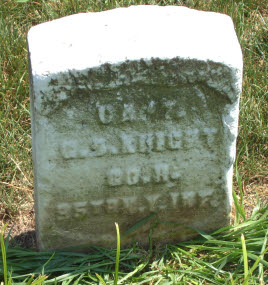
KNIGHT, GEORGE D. (1835-1902). Captain, 95th New York Infantry, Company E. A native of New York City, he enlisted as a first sergeant at his birthplace on October 21, 1861, and mustered into the 95th on December 18. He rose in rank becoming a second lieutenant on August 31, 1862, and a captain on September 1, 1864. On July 16, 1865, he mustered out at in the field in Virginia. In 1890, he applied for and received an invalid pension, certificate 830,436. Knight last resided at 253 Lafayette Avenue in Brooklyn. A marble Veterans Administration stone was ordered for him early in the 20th century. Section 139, lot 31148, grave 1.
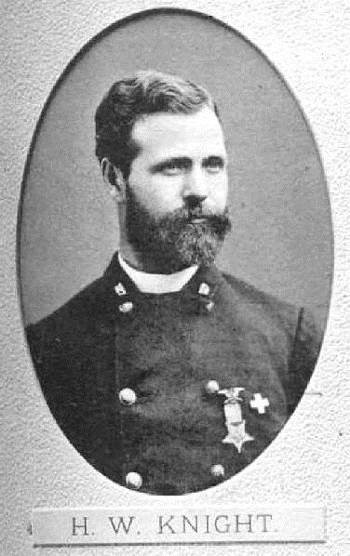
KNIGHT (or KNIGHTS), HENRY W. (1847-1917). Private, 7th Maine Infantry, Companies B and G; 1st Maine Veteran Infantry, Companies G and I; 7th Veteran Reserve Corps, Company B. Born in London, England, his father died when he was an infant and he moved with his mother to Quebec, Canada, in 1855. When his mother died shortly after that move, he was placed in an orphanage, and then sent to live with a family that didn’t treat him kindly. At 12, he ran away to Biddleford, Maine, where he fended for his own and worked for the printers in the office of the Union and Journal.
Knight was shy of 16 when he enlisted as a private on December 4, 1862, and mustered into Company B of the 7th Maine Infantry. He was wounded at Salem Heights, Virginia, on May 4, 1863, and transferred into Company G in 1864. He saw action in many Civil War battles including Chancellorsville, Virginia, where he was twice wounded on May 2, 1864. Later that year, he was transferred into the Veterans Reserve Corps due to his wounds and was stationed at the War Department in Washington, D.C., where he was present on the night of President’s Lincoln’s assassination and was involved in the events in the aftermath of the tragedy. He mustered out by special order of the secretary of war on July 5, 1865. His pension record indicates service in Companies G and I of the 1st Maine Veteran Infantry, and in the 7th Veteran Reserve Corps. In 1865, he was awarded an invalid pension, certificate 65,035.
In civilian life, Knight was a publisher and was head of the printing department of the Methodist Book Concern for many years. Remaining active in military affairs, he was a post commander of the Ulysses S. Grant Post #327, Grand Army of the Republic, and was active in the financial matters of that organization. President’s Grant’s son, Colonel Dent Grant, chose Knight to lead the detail and remain with the president’s body for all the funeral ceremonies from Mt. McGregor, New York, to City Hall, and then Riverside Park, New York City. He was one of six men who remained with the body twenty-four hours a day until the last rites. He last lived at 988 Bergen Street in Brooklyn. After his death from nephritis, Tressa Knight, who is interred with him, applied for and received a widow’s pension in 1917, certificate 841,234. Section 174, lot 26106.
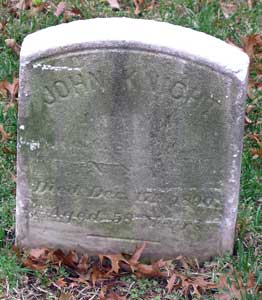
KNIGHT, JOHN (1832-1890). Private, 82nd New York Infantry, Company C. Of English origin, Knight enlisted at New York City as a private on June 14, 1861, and mustered into the 82nd New York. On October 19, 1862, he was discharged for disability received in combat at Bolivar, West Virginia. His last residence was 210 13th Street, Brooklyn. Section 184, lot 19119.
KNIGHT, JOSEPH (1840-1911). Captain, 62nd New York Infantry, Company K. After enlisting as a corporal on May 1, 1861, at New York City, he mustered in on that date, was promoted to first lieutenant on July 1, 1861, and achieved the rank of captain on August 31, 1861. He was discharged on May 22, 1862. His last residence was in Manhattan where he died of a cerebral hemorrhage. Section 65, lot 20219.